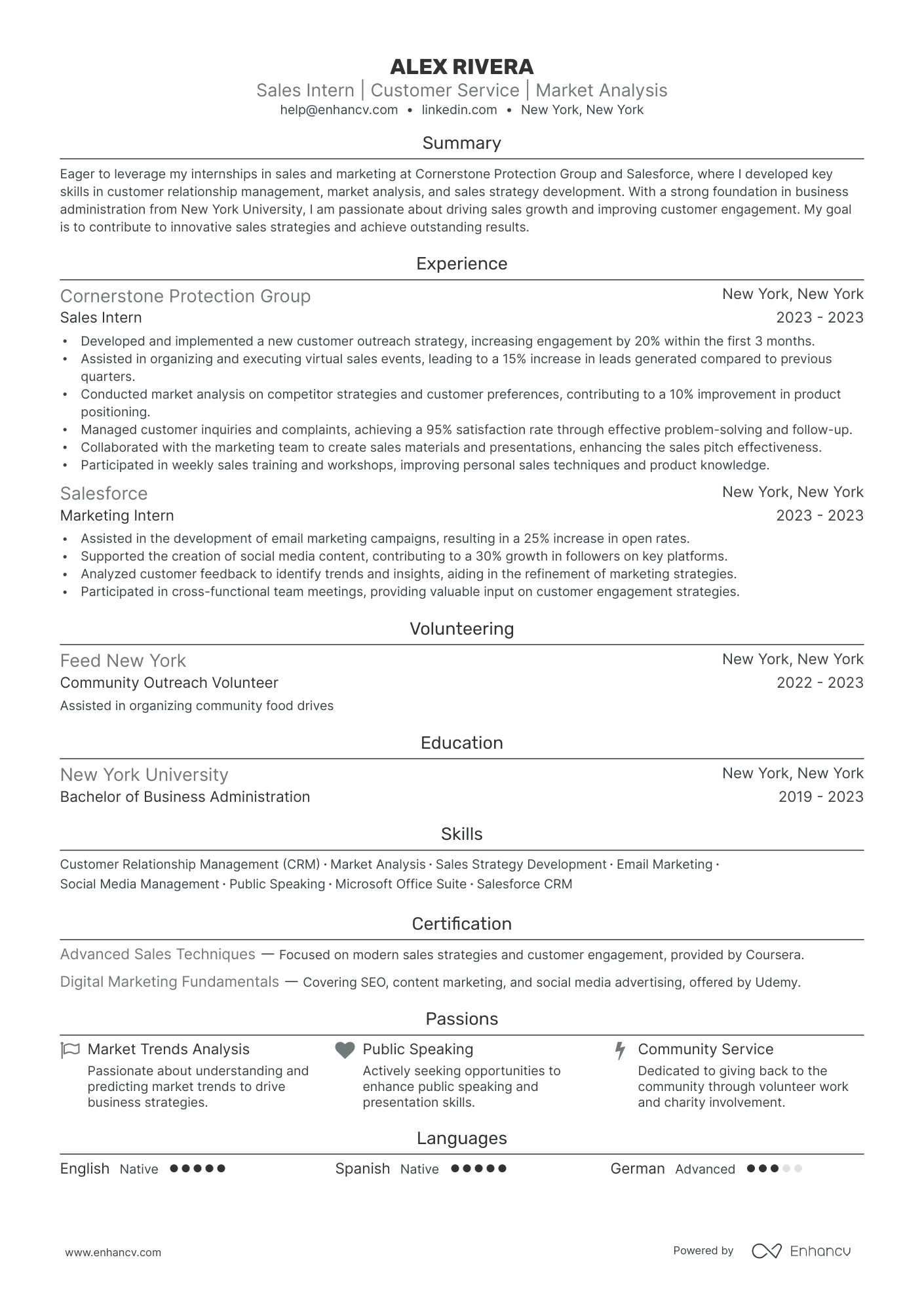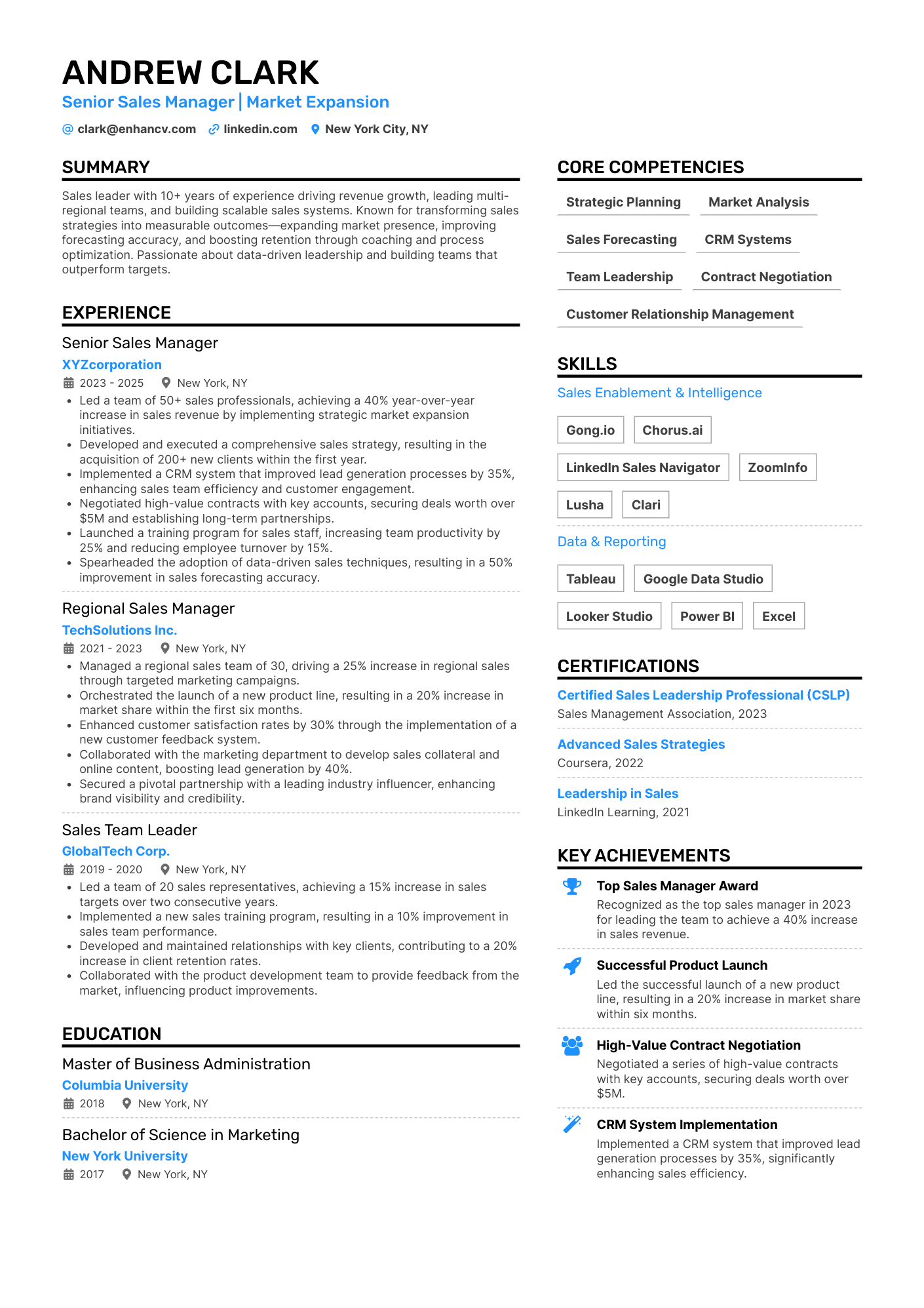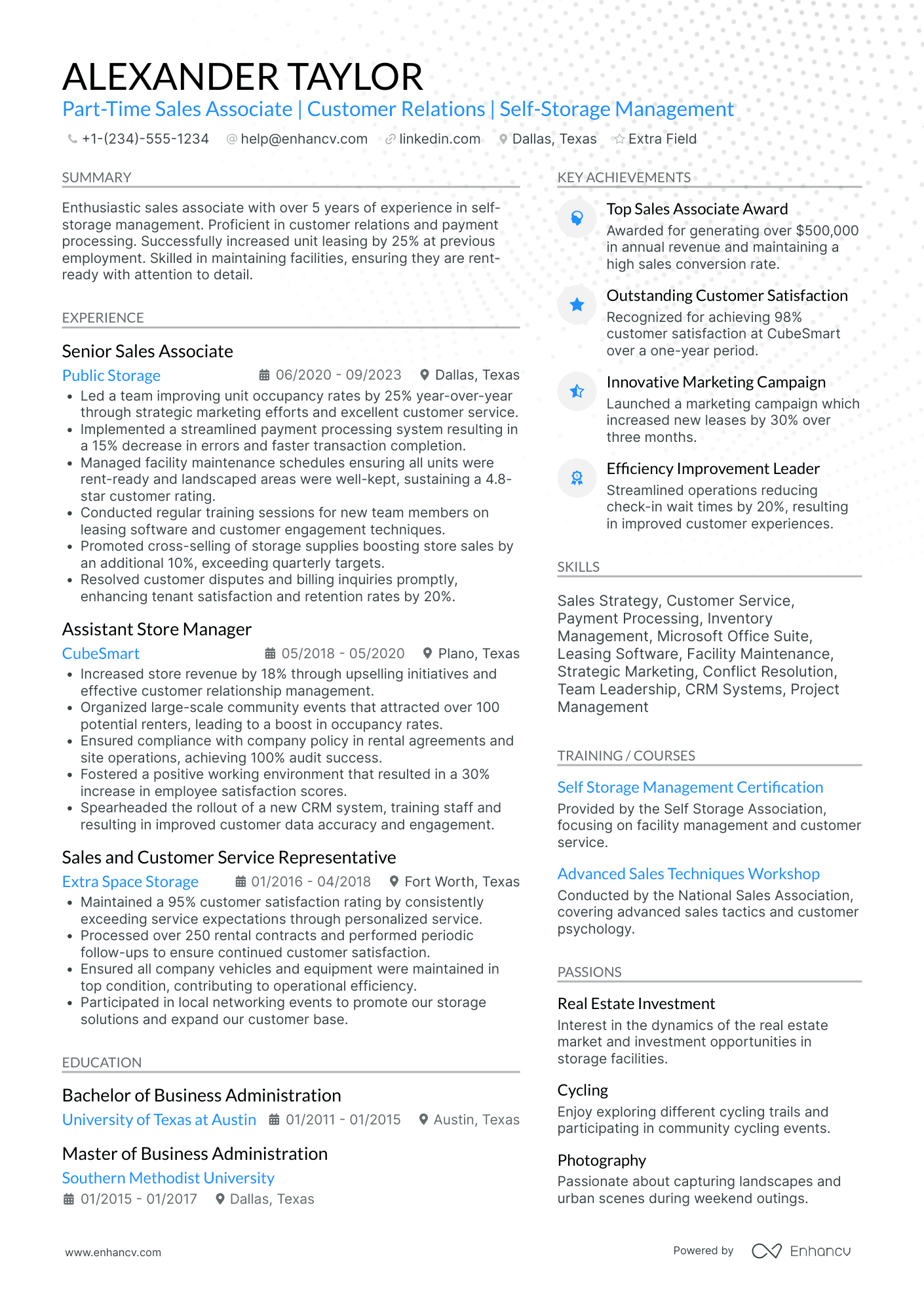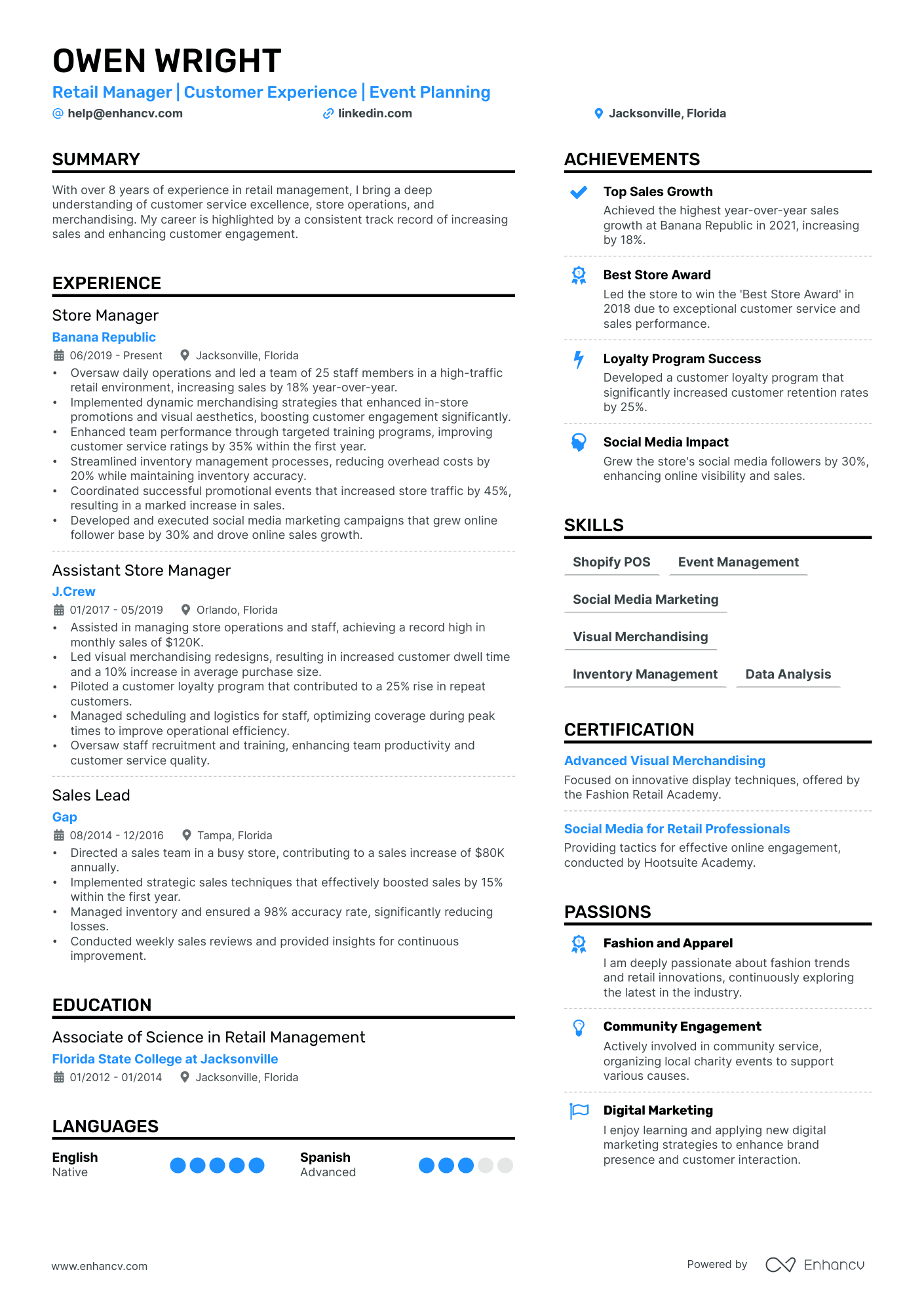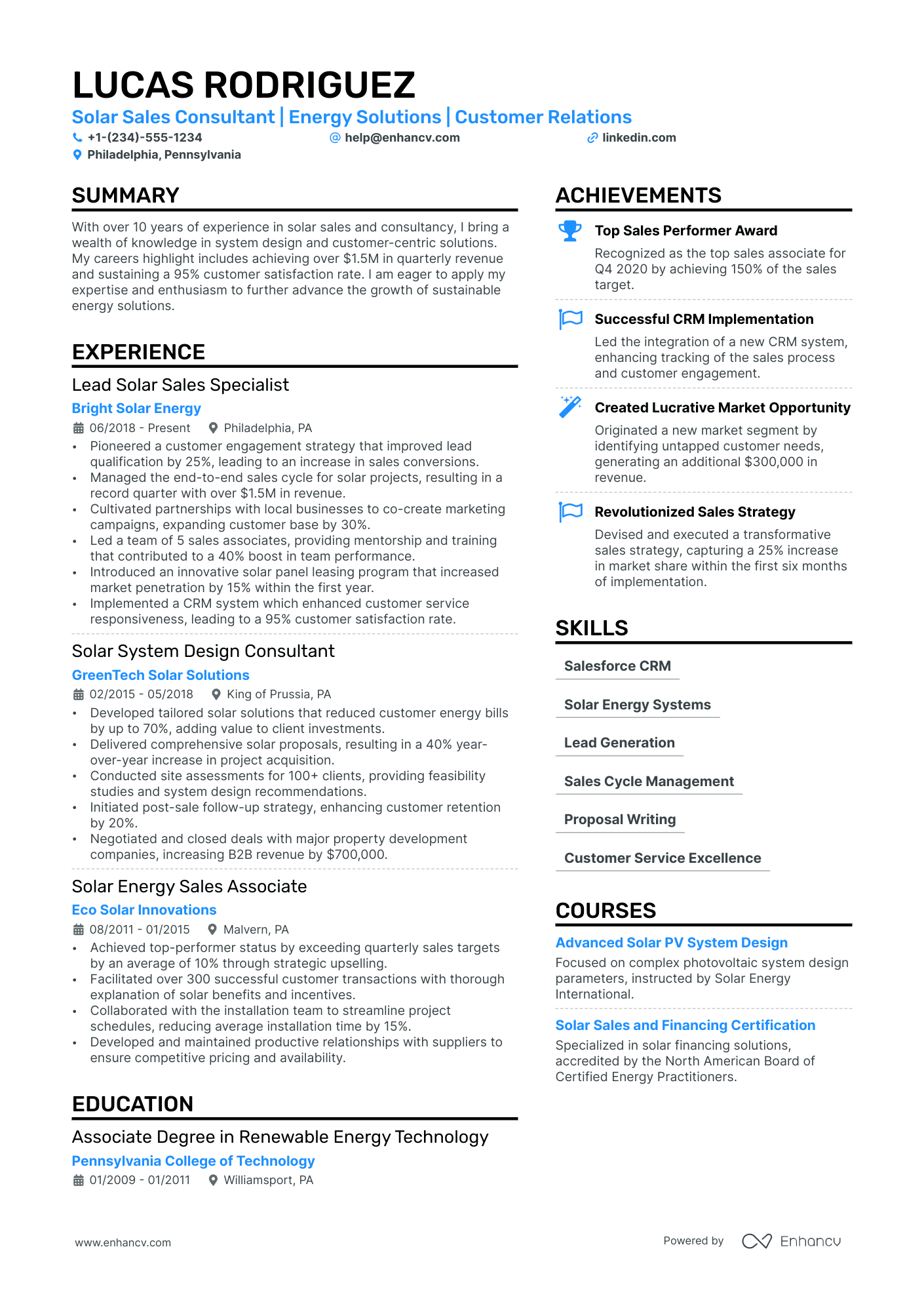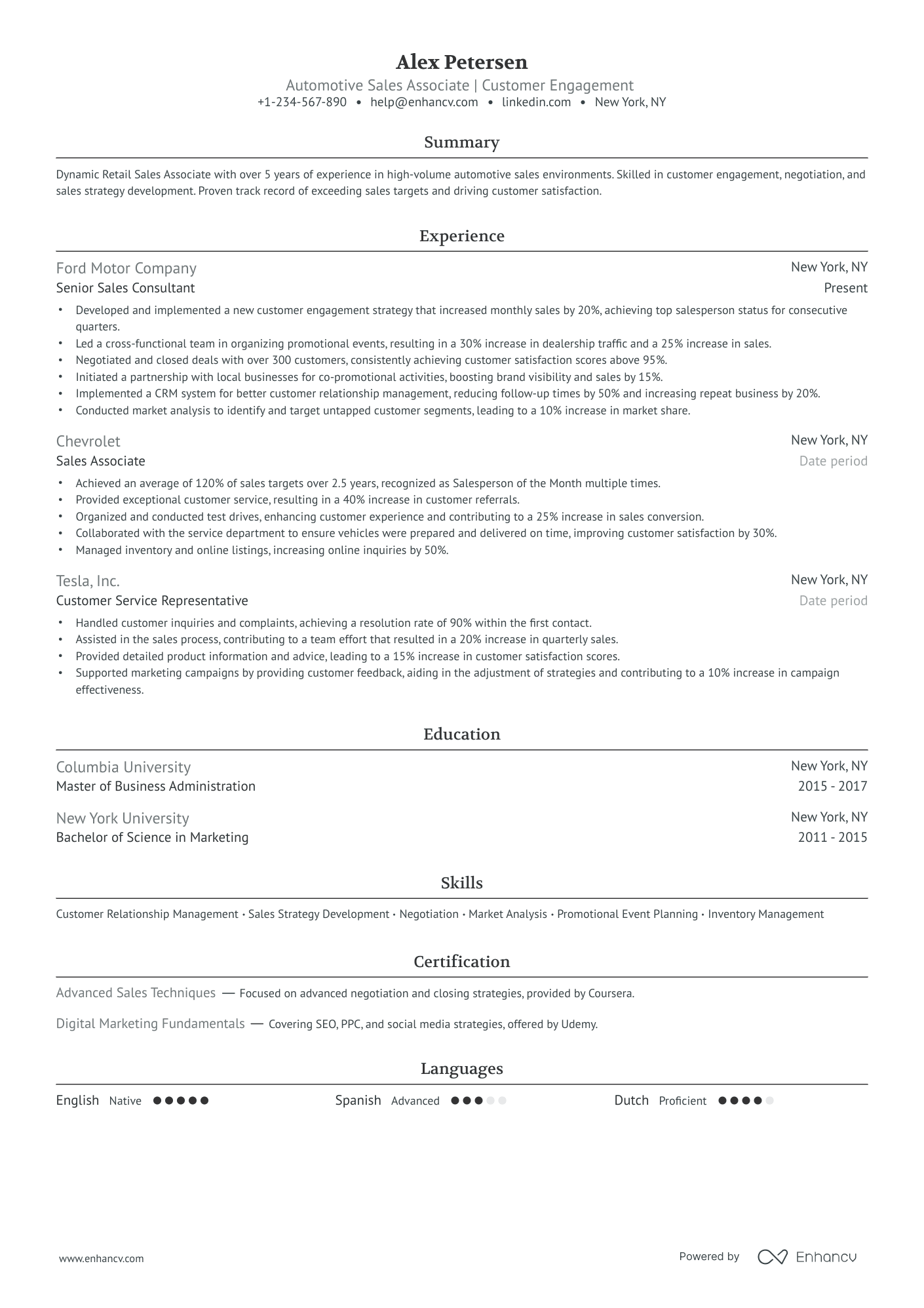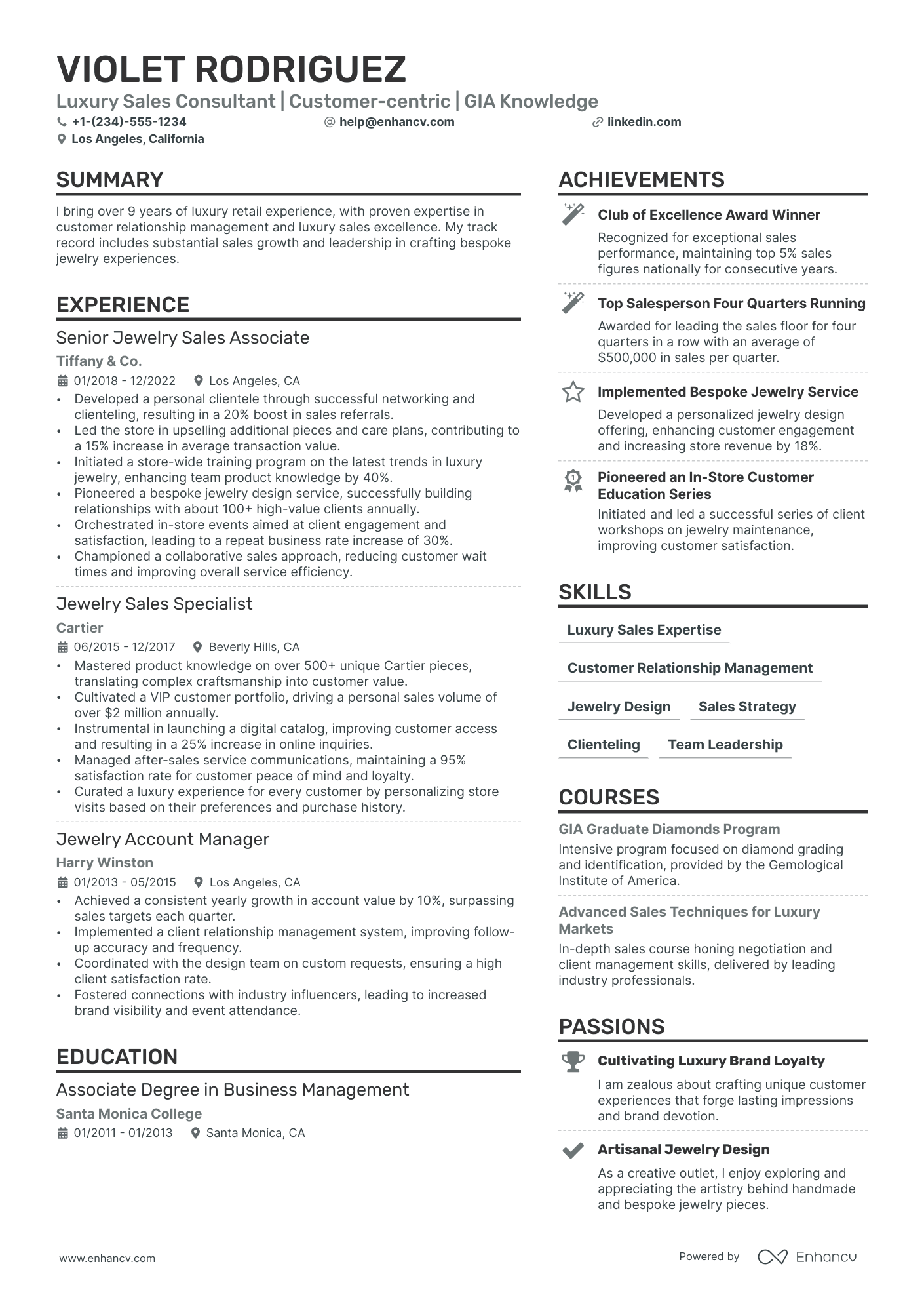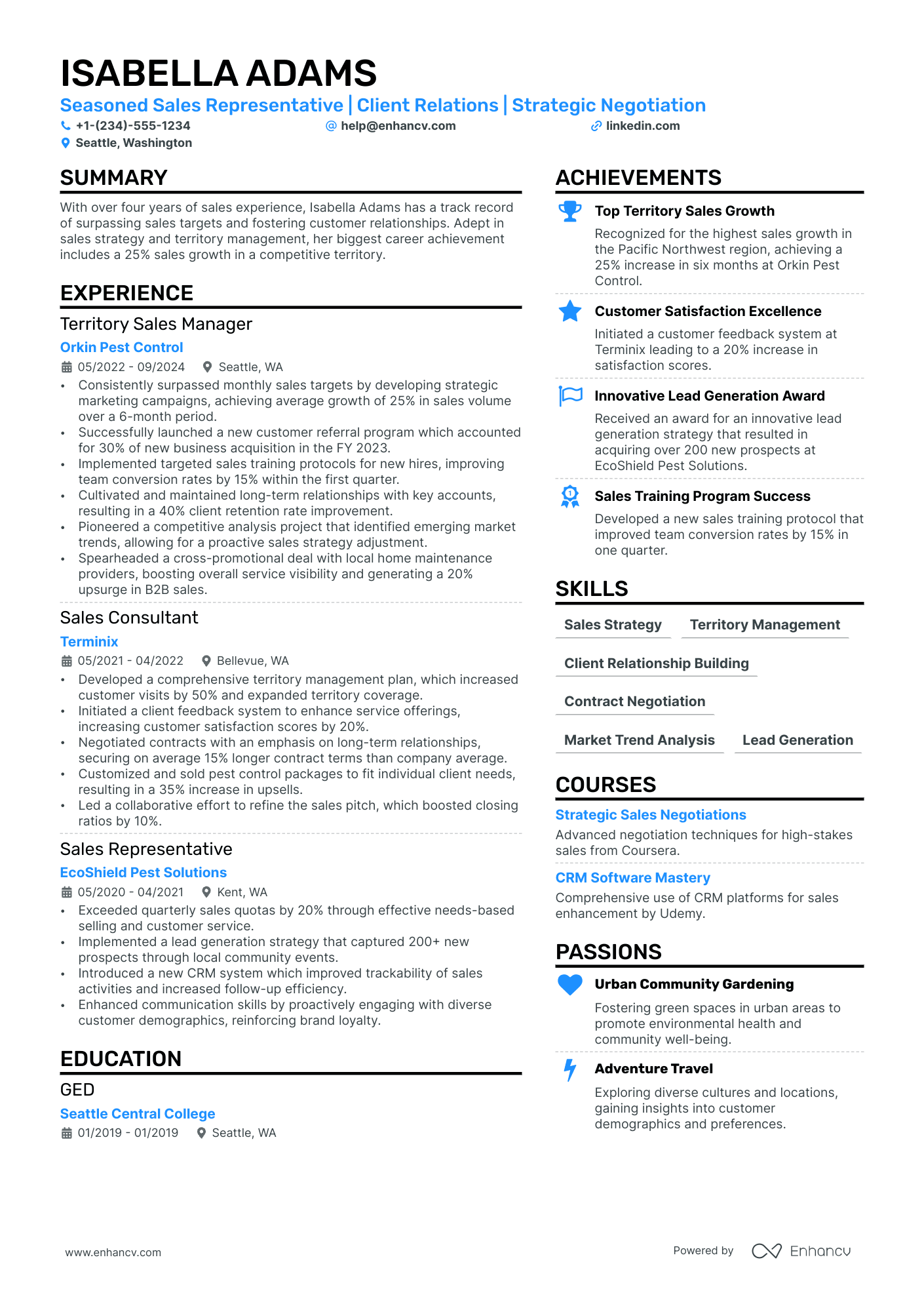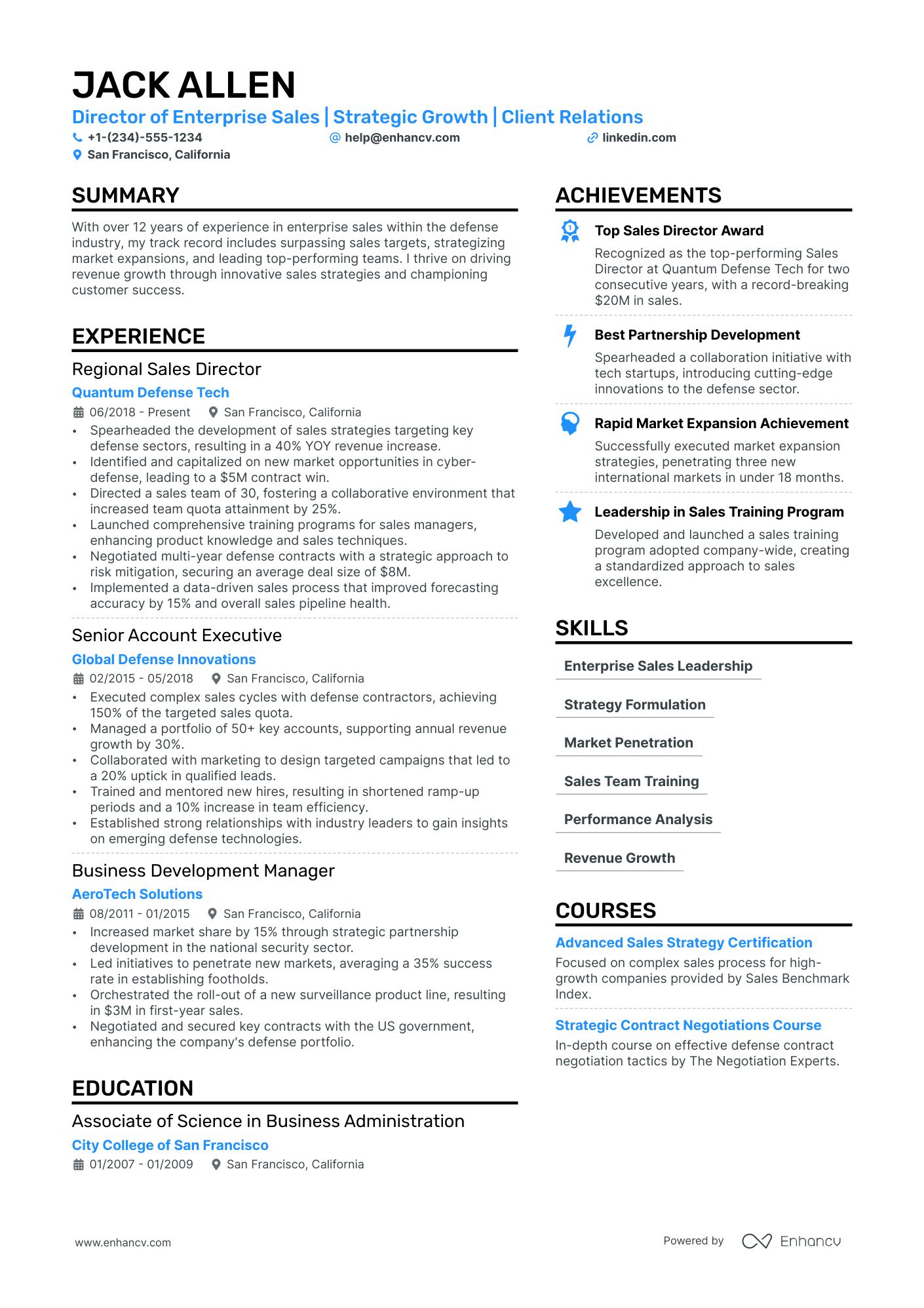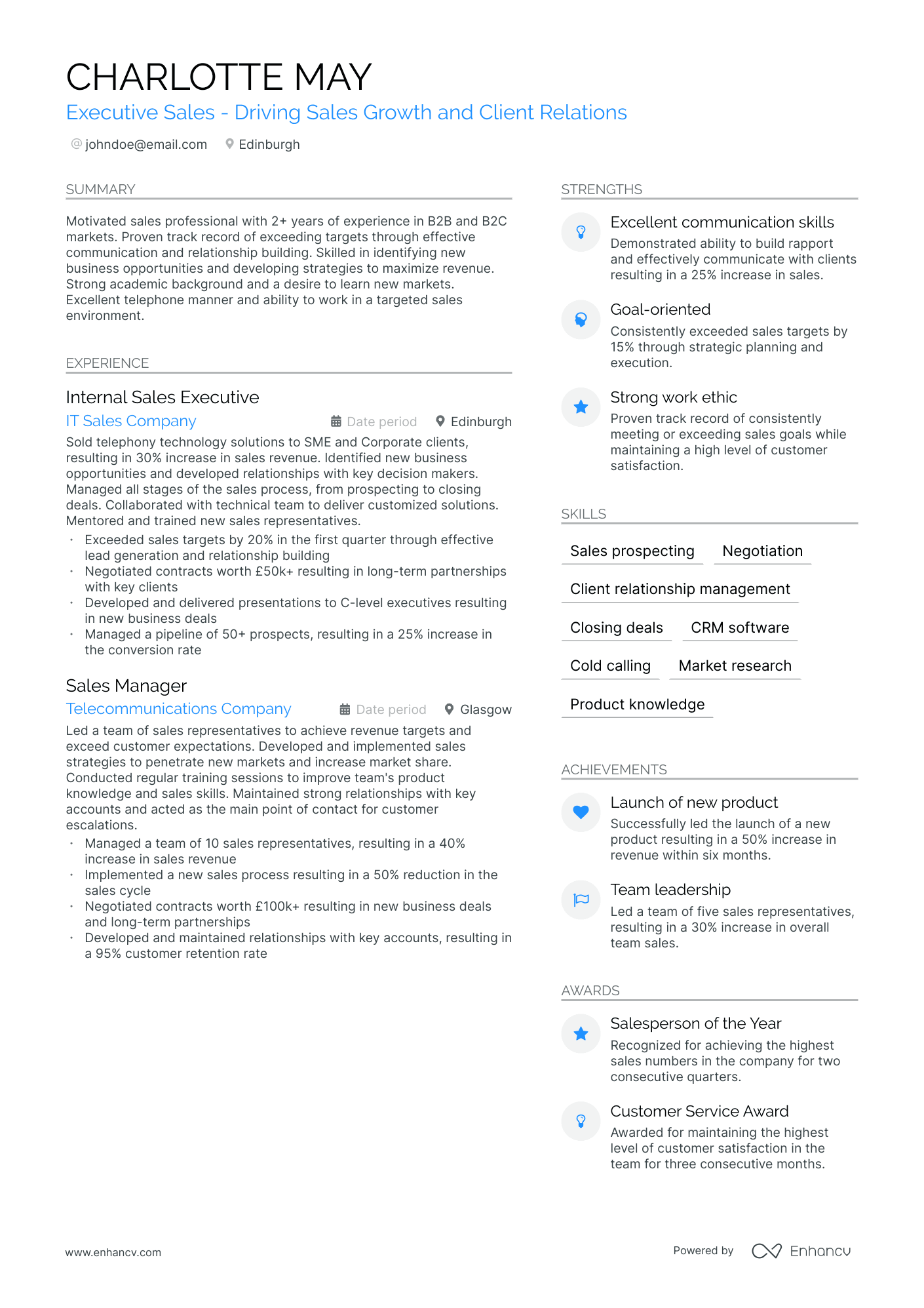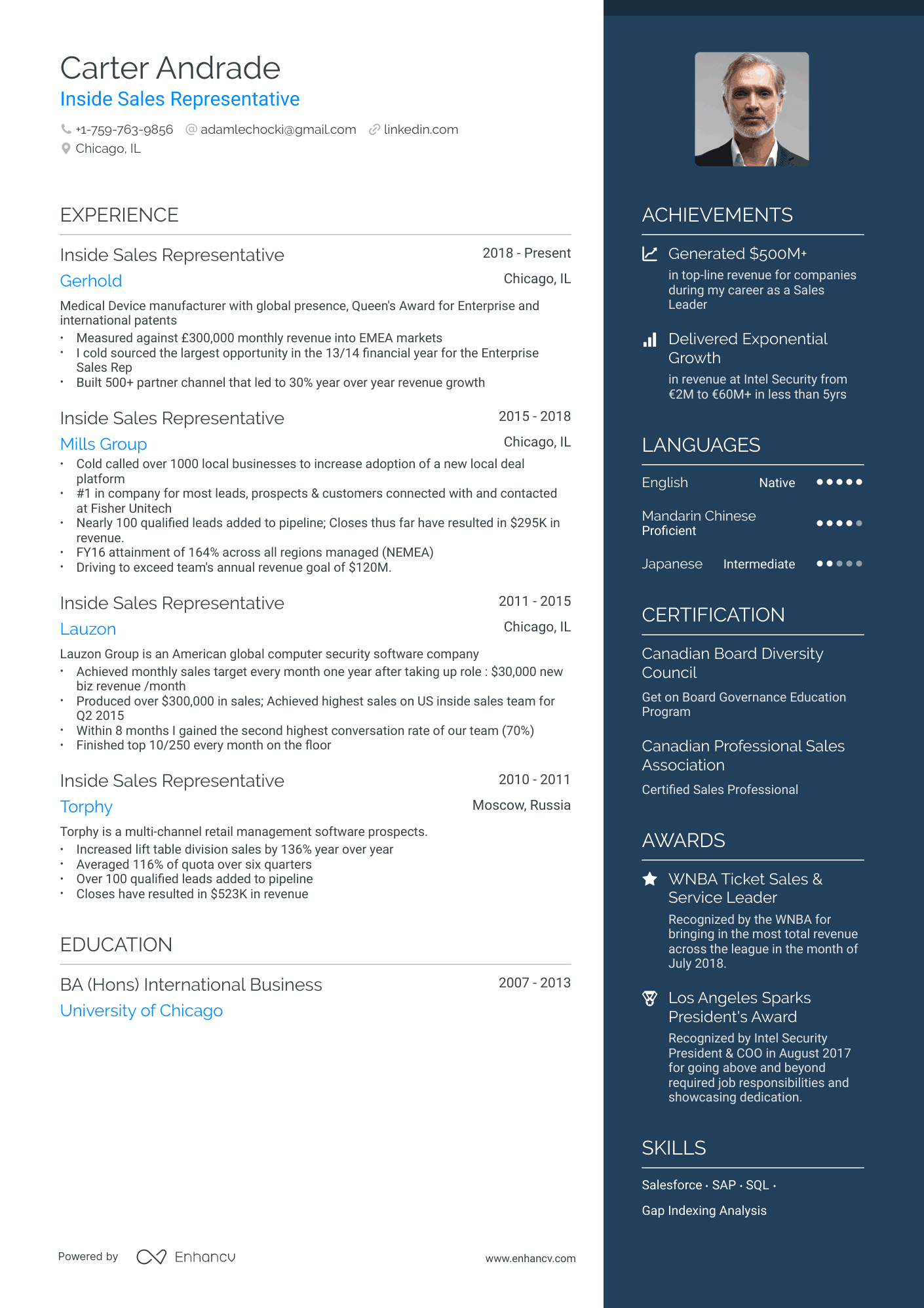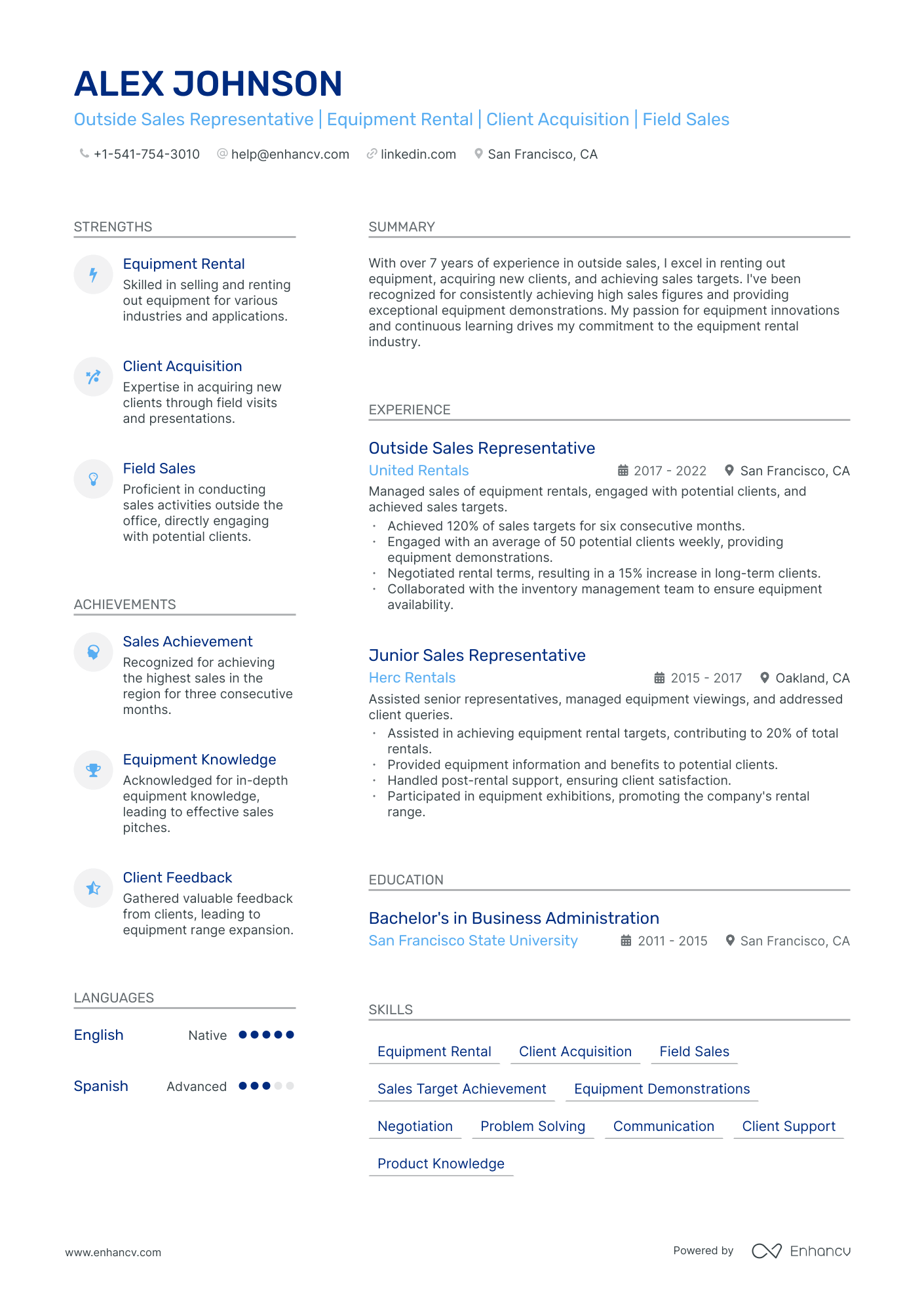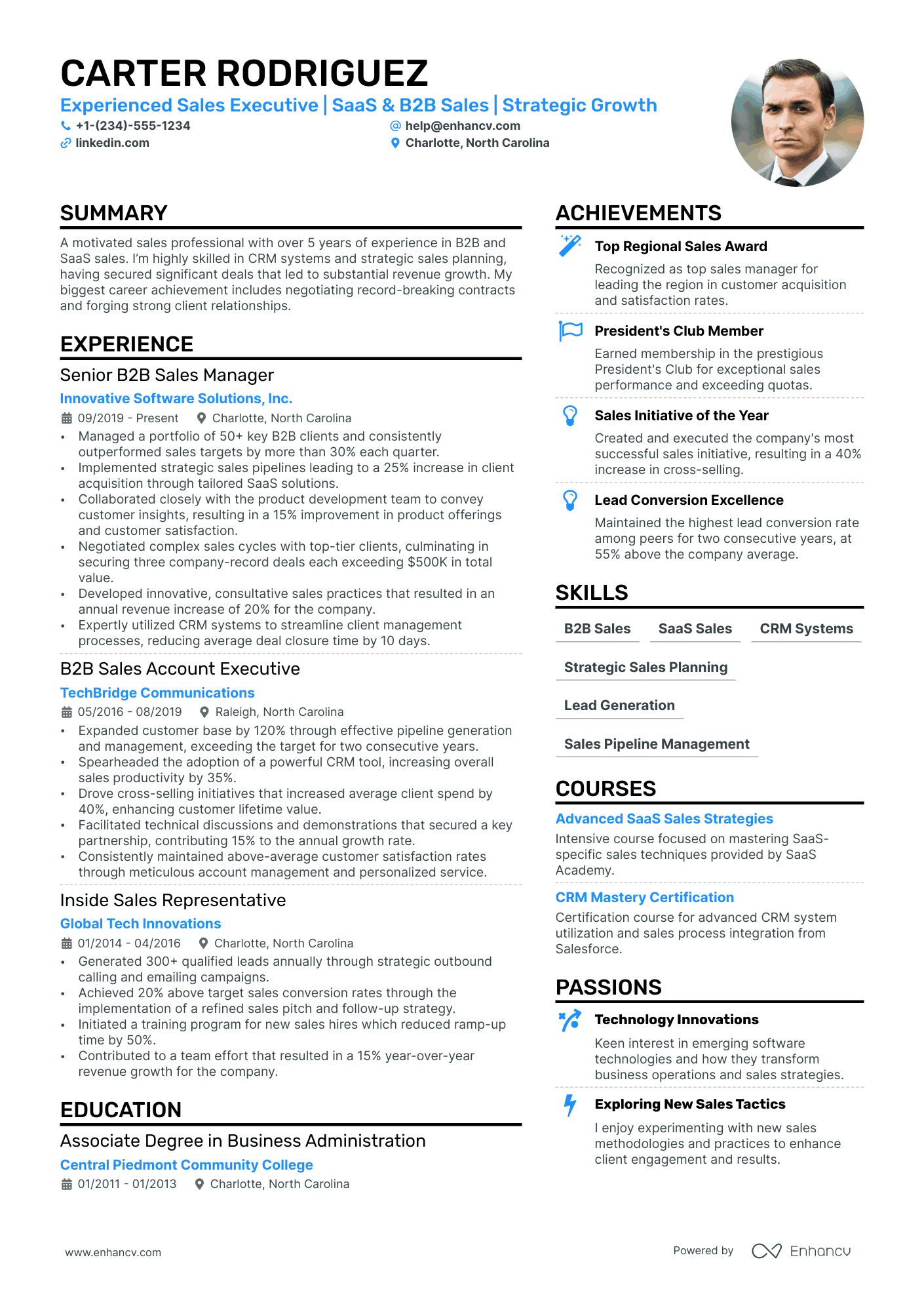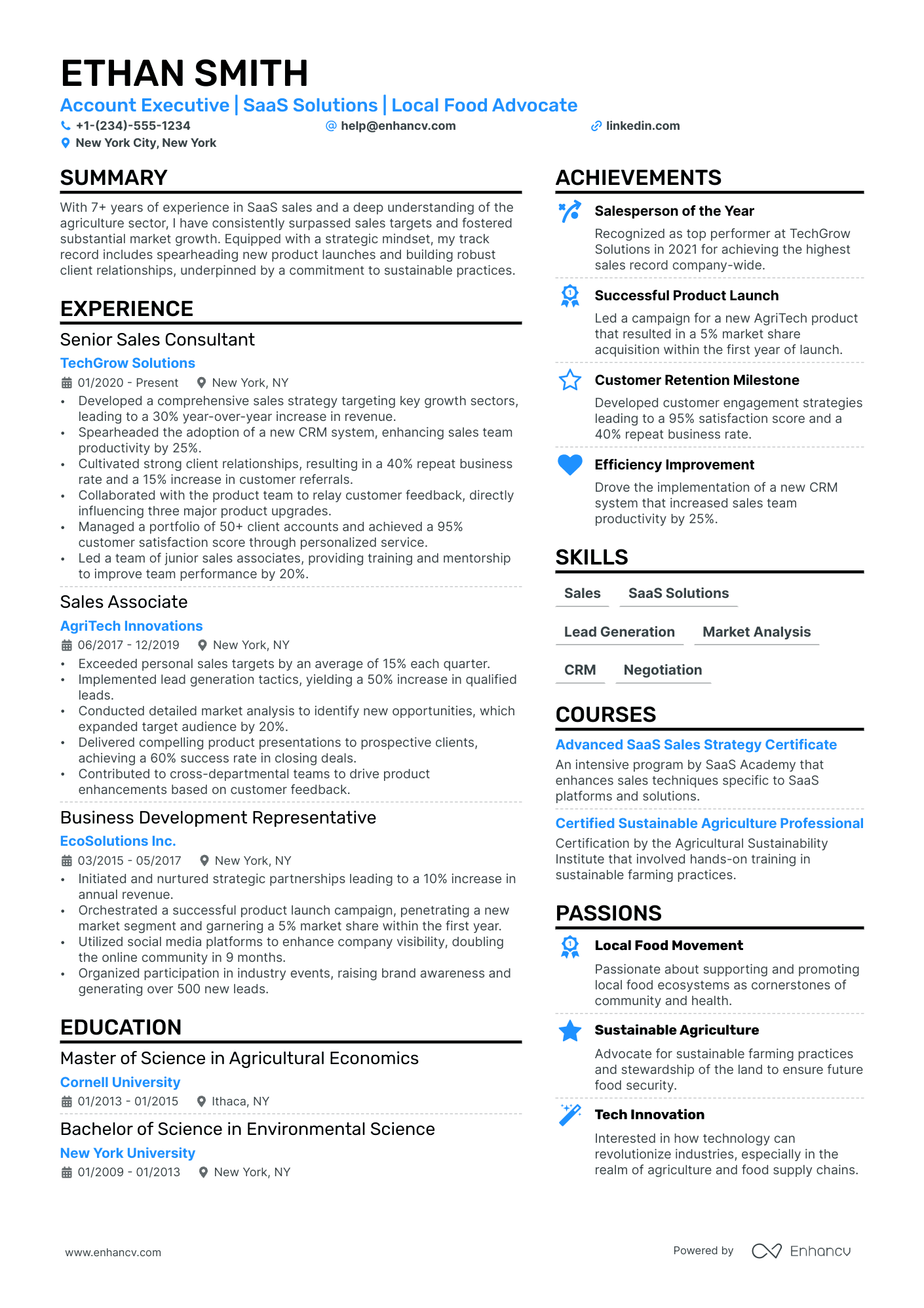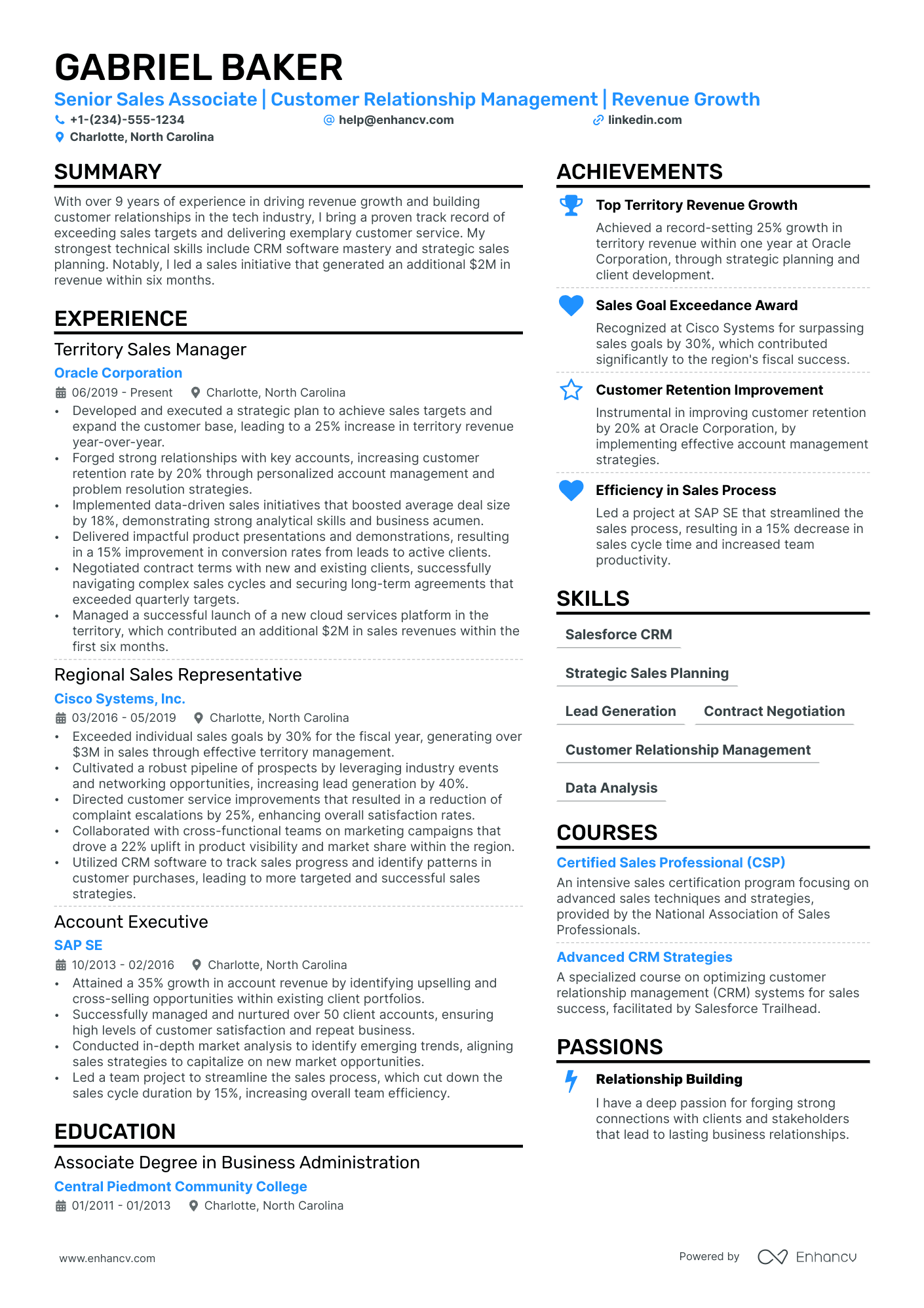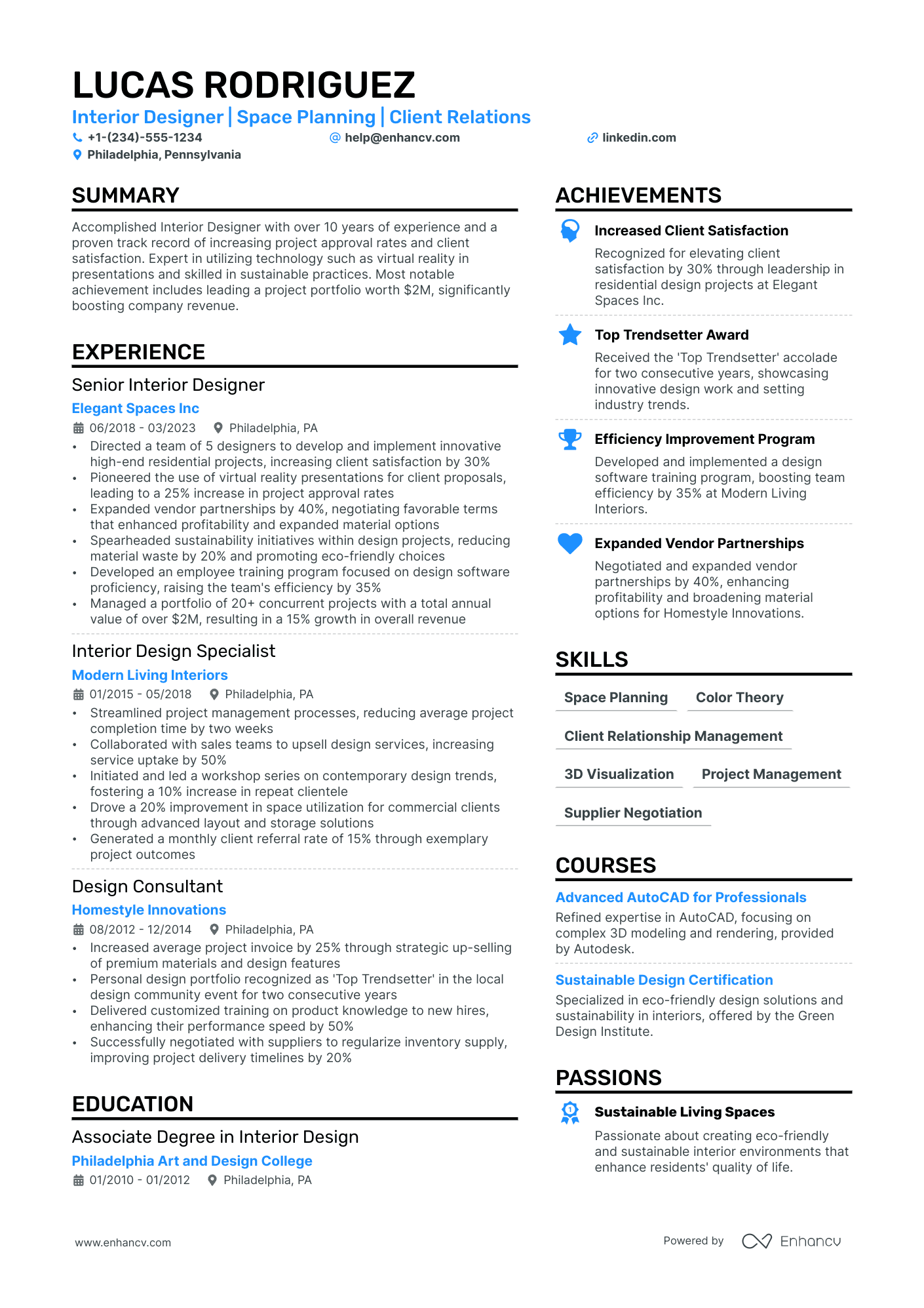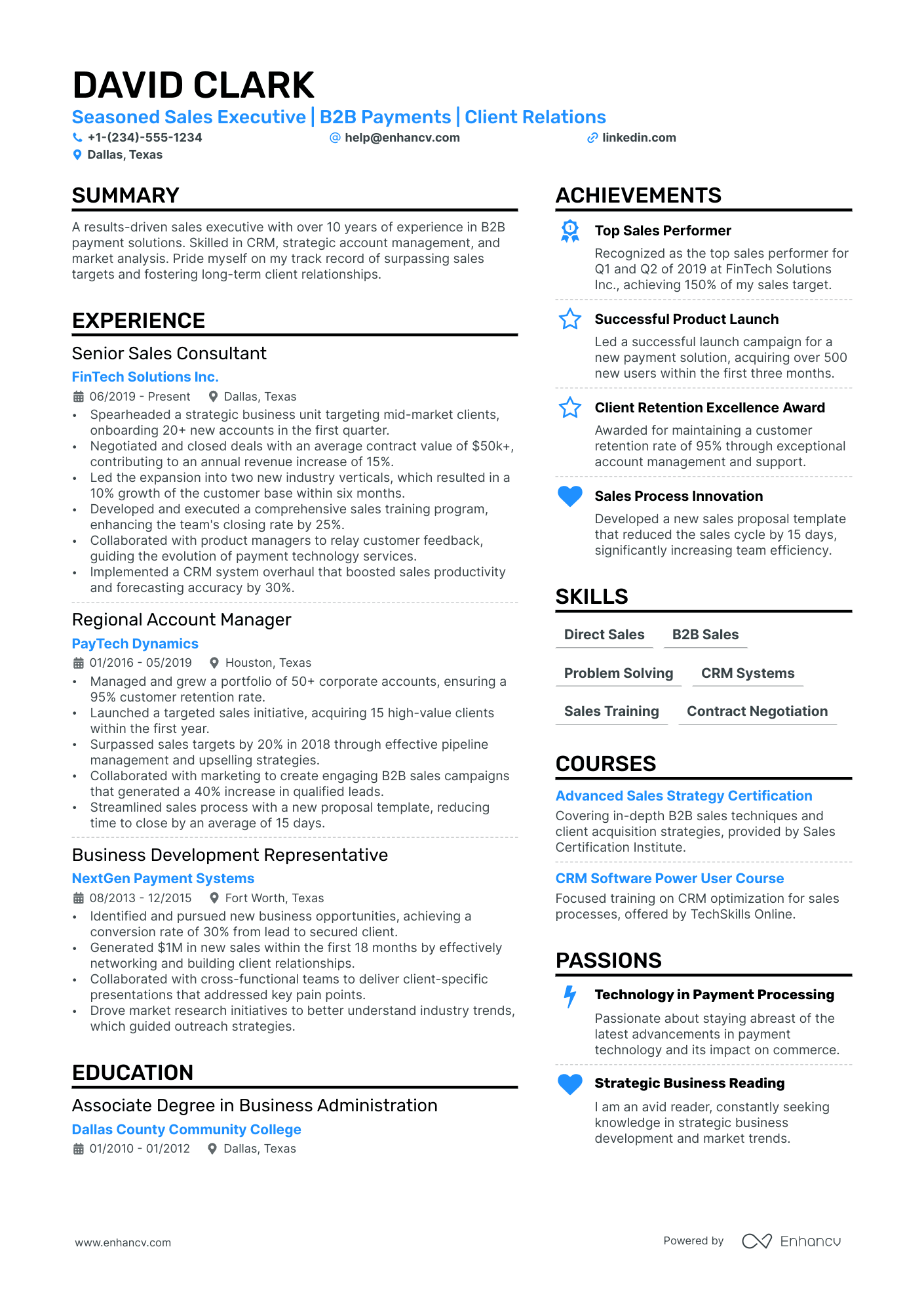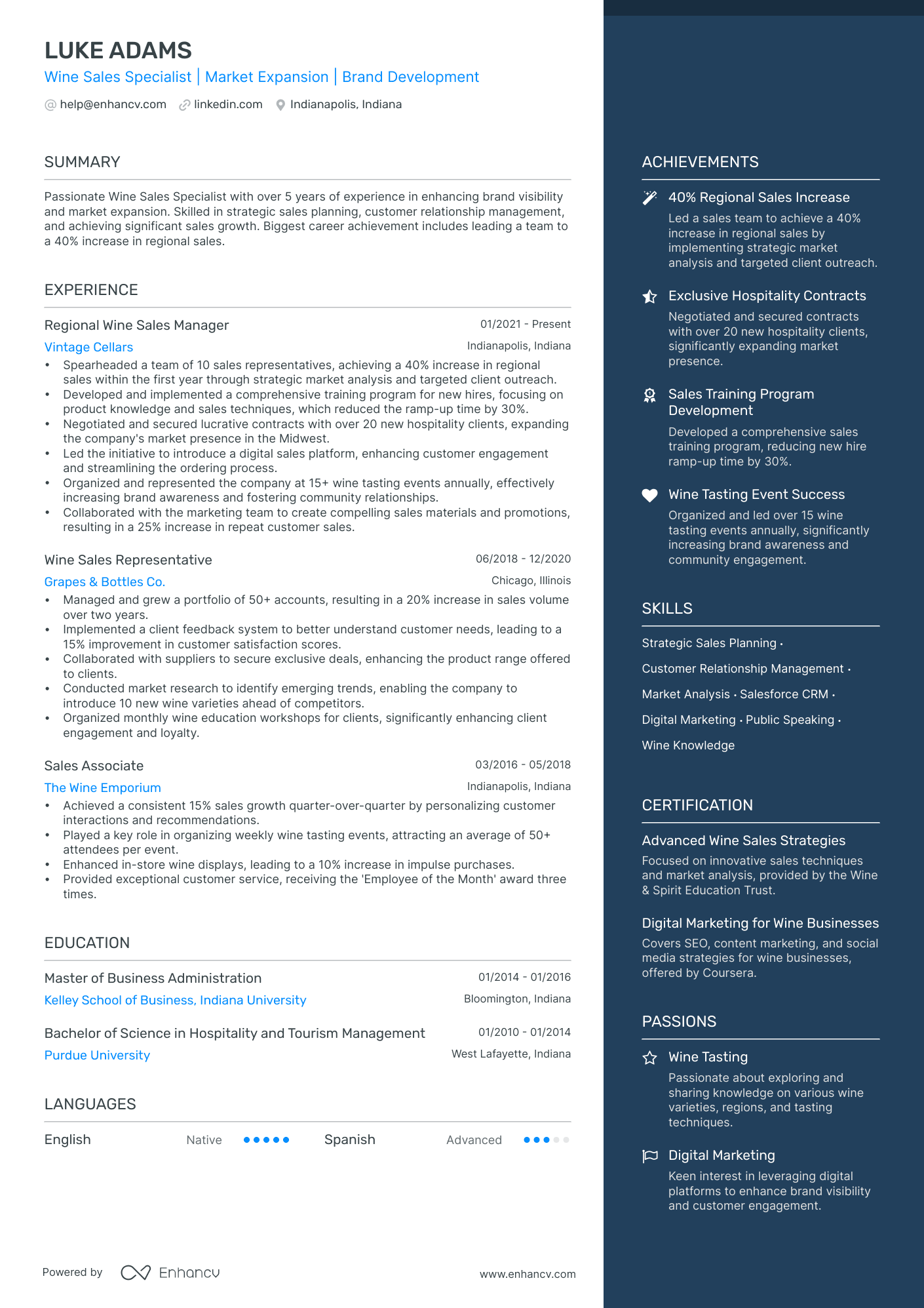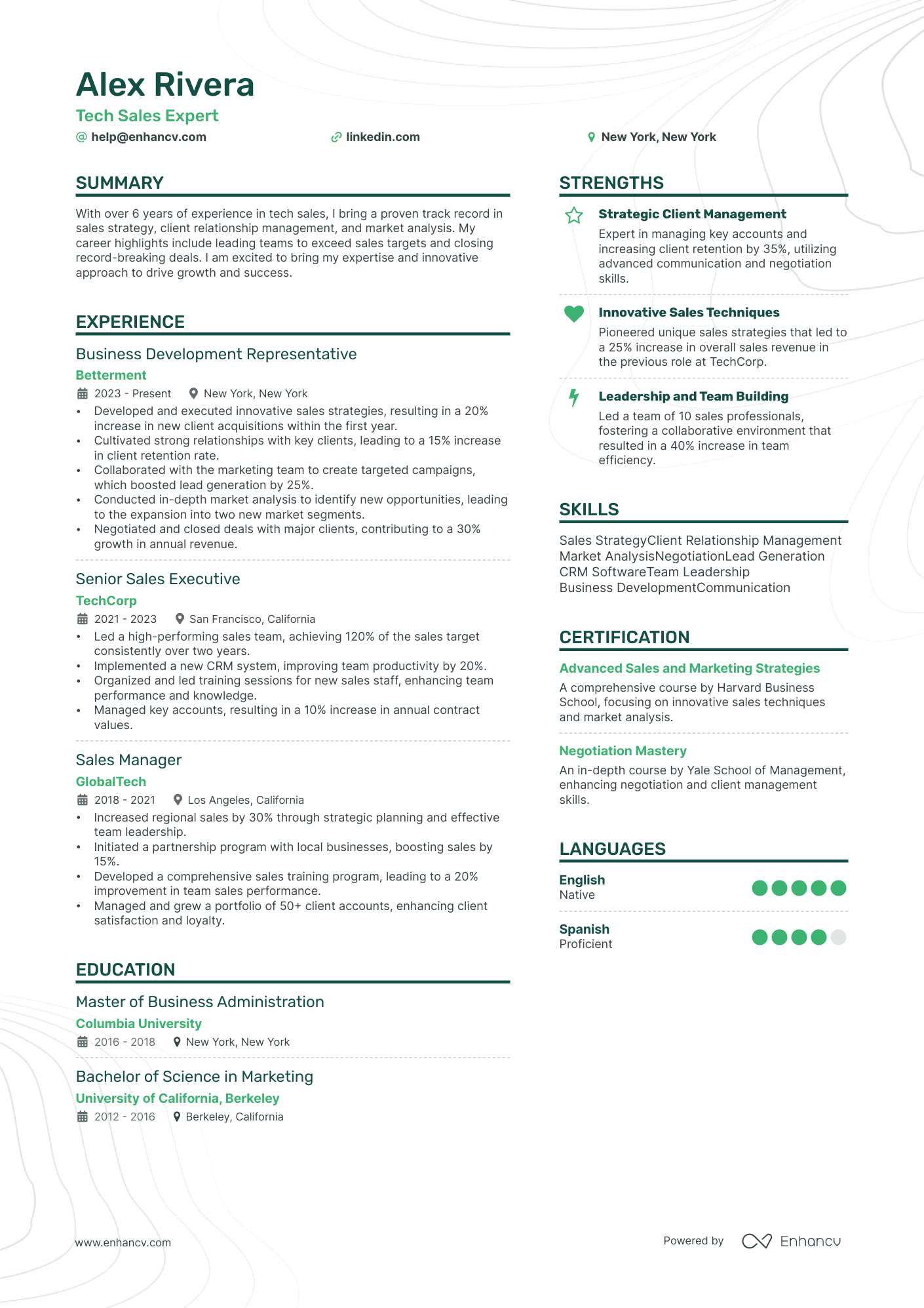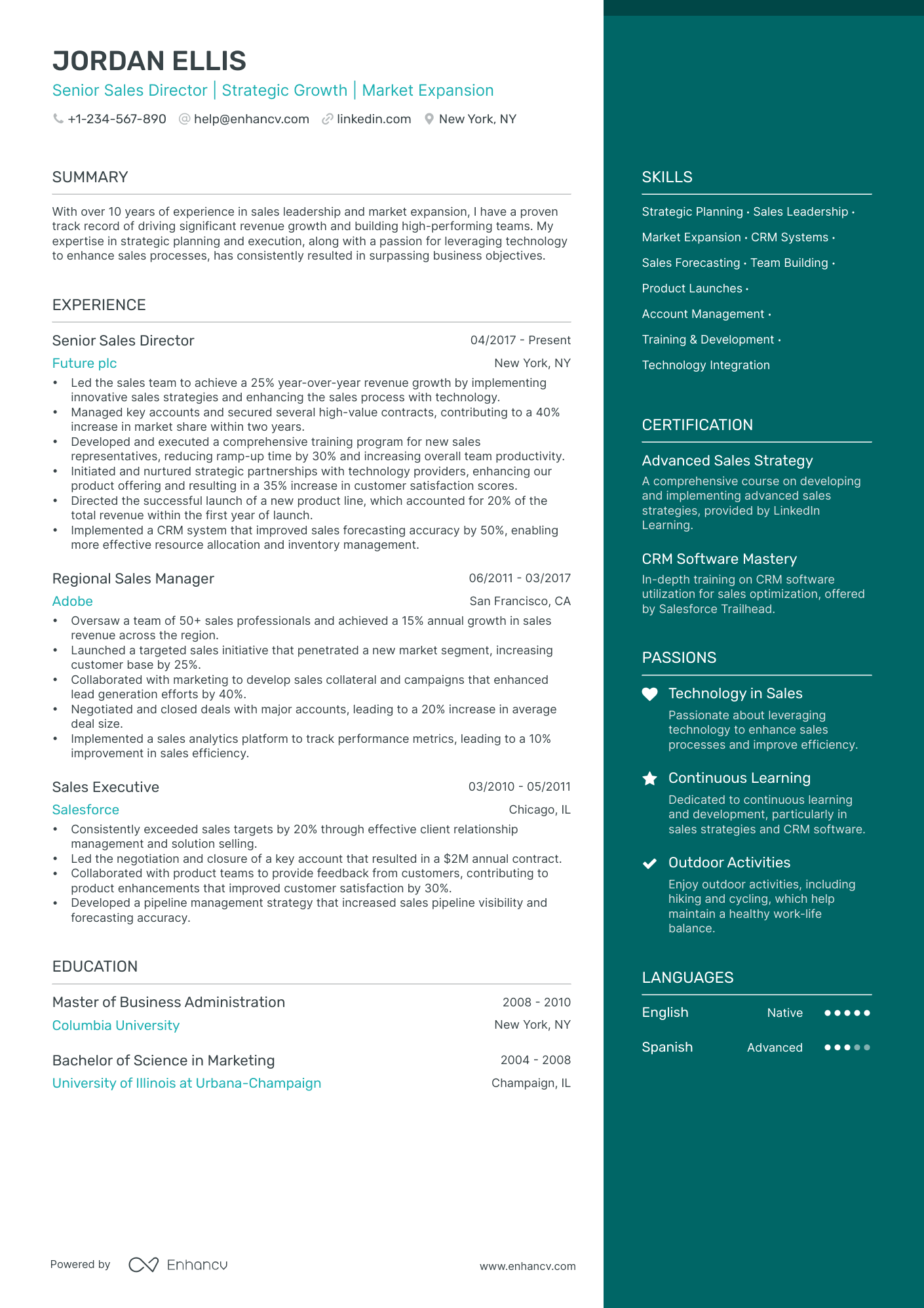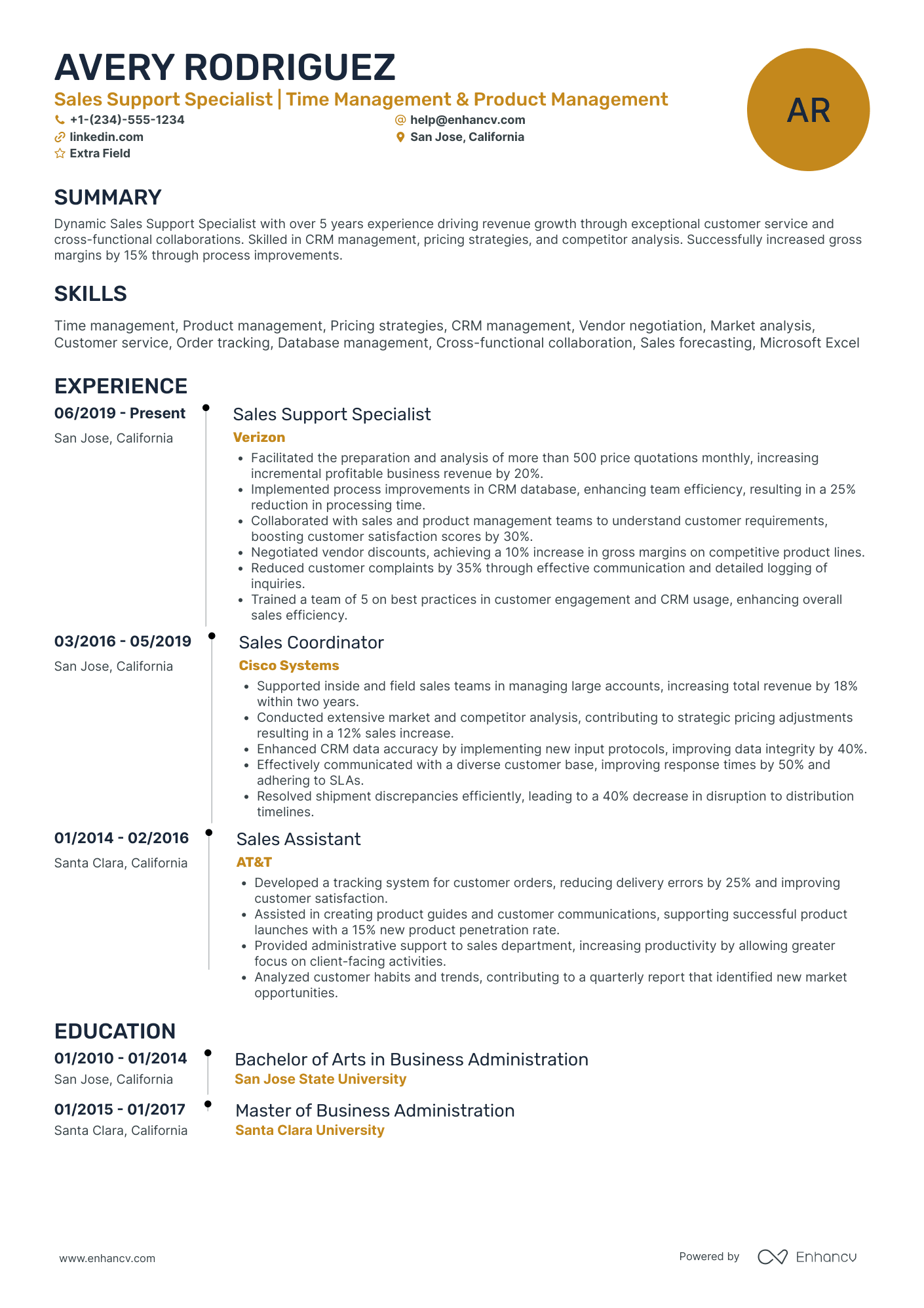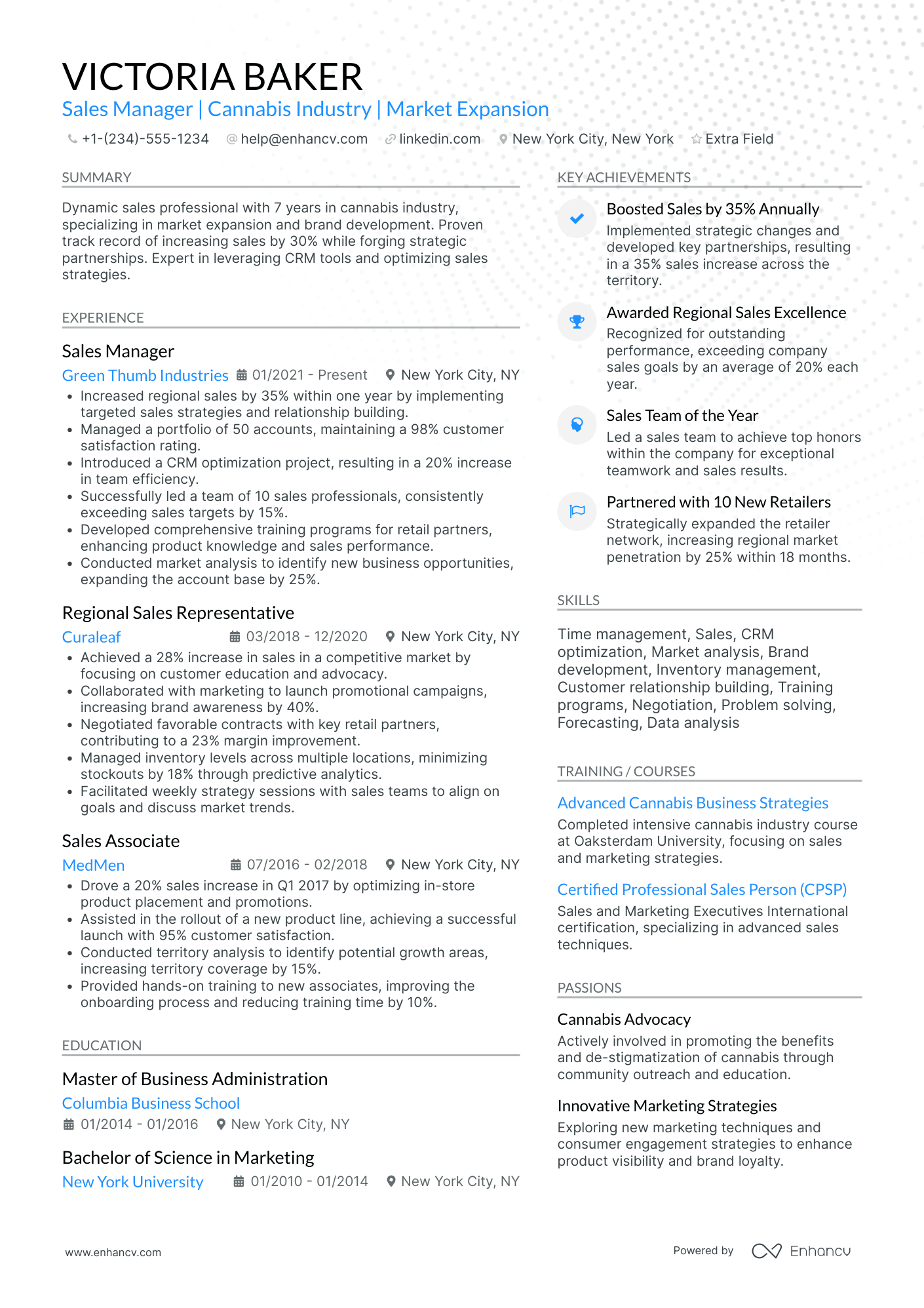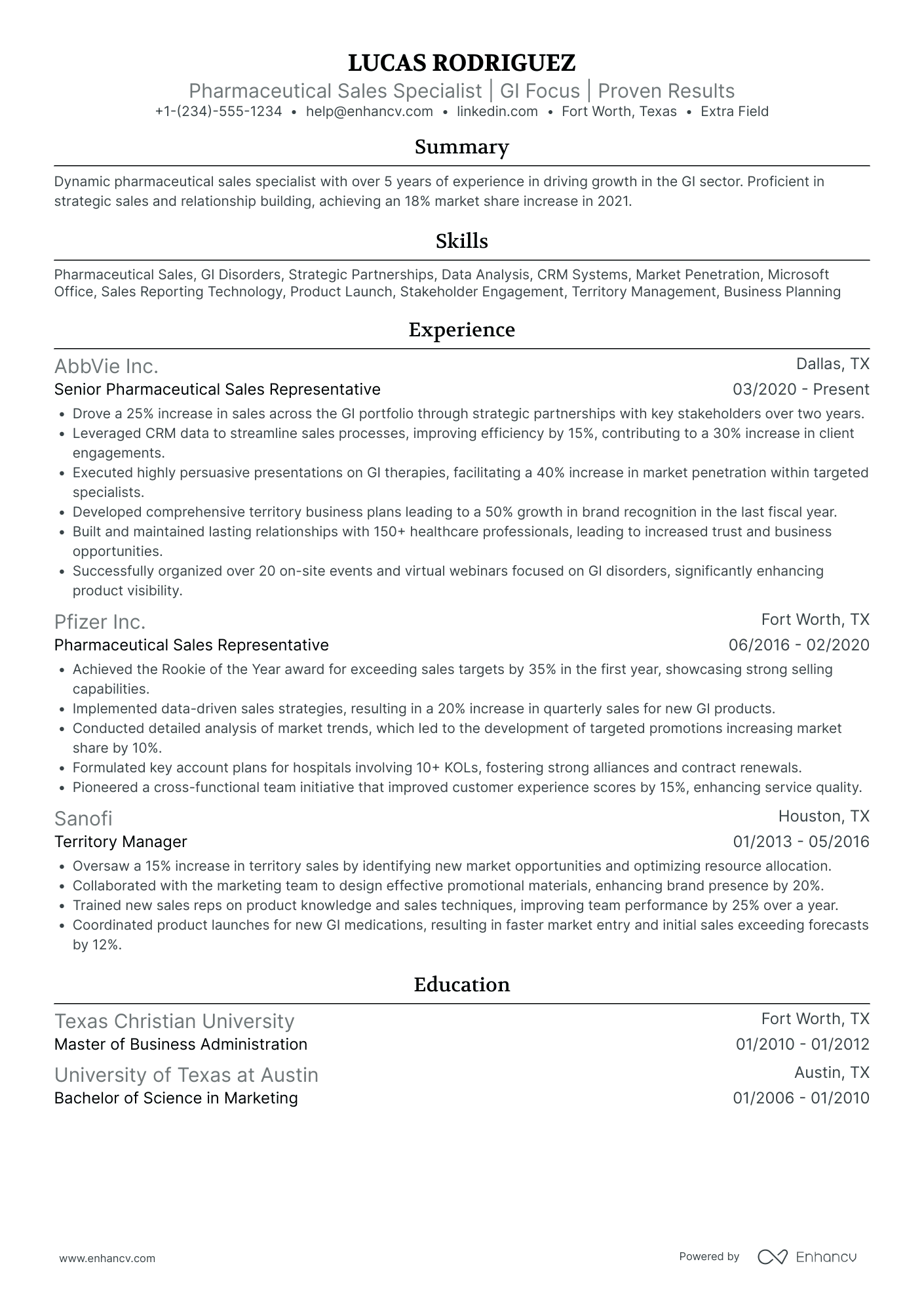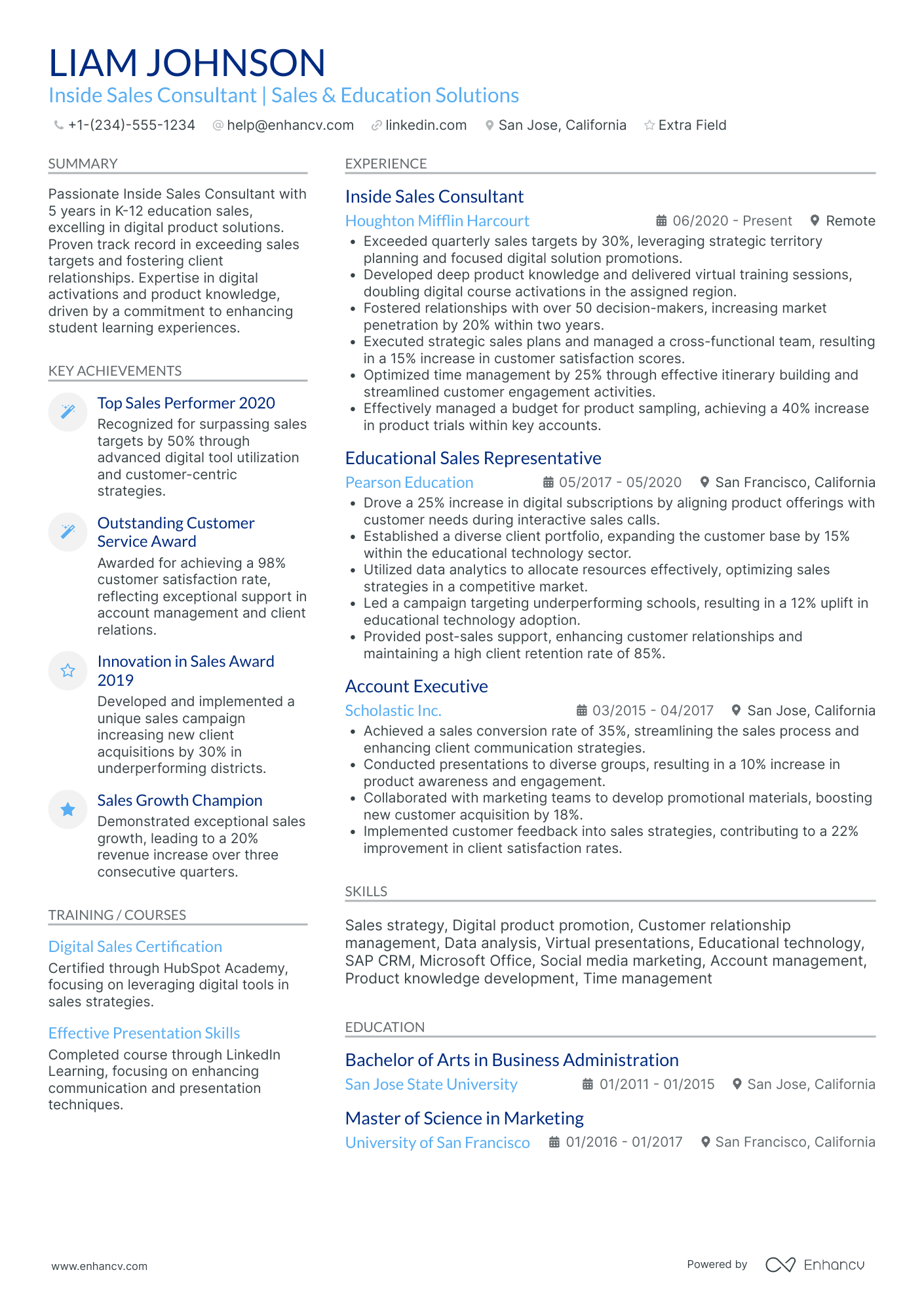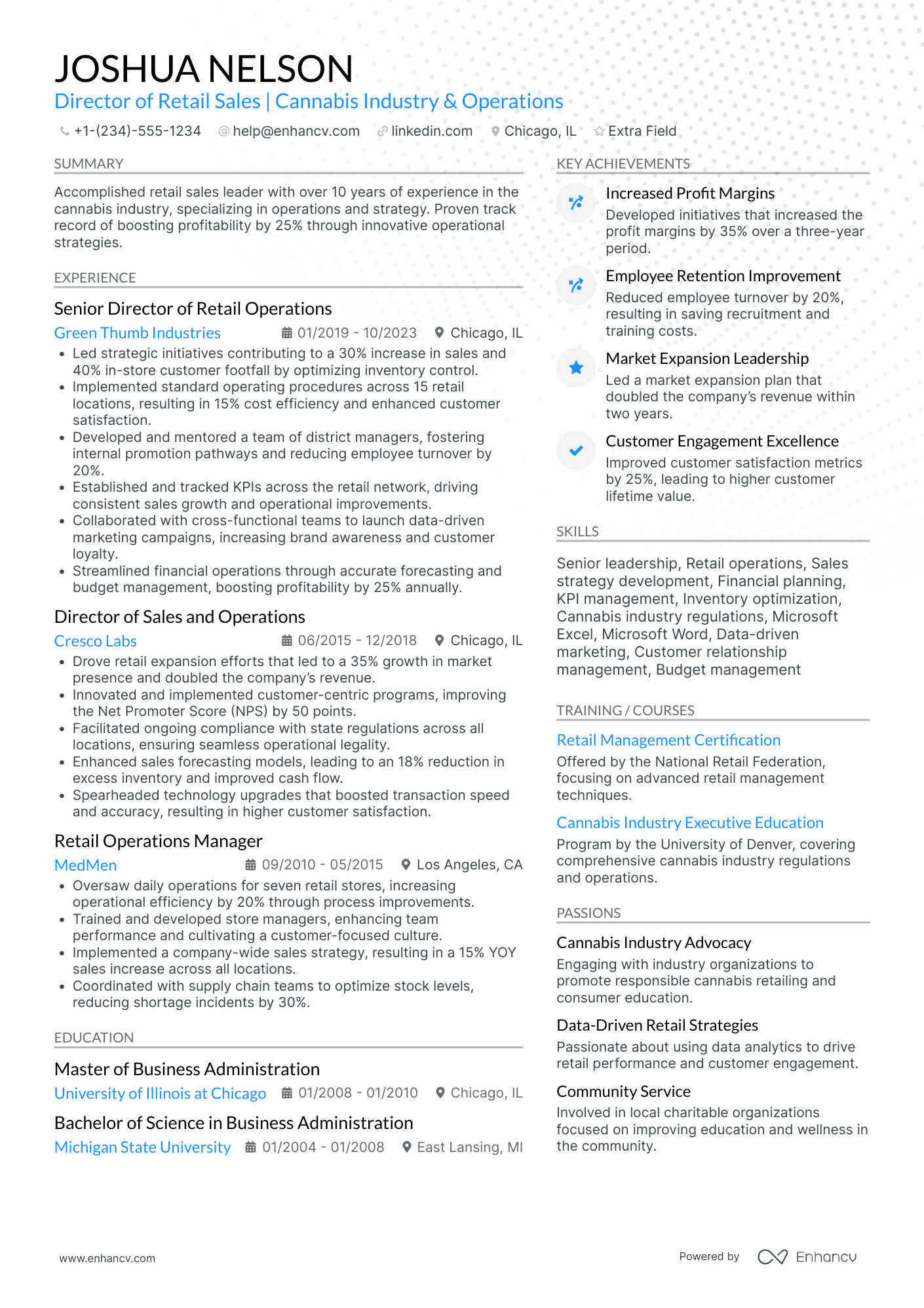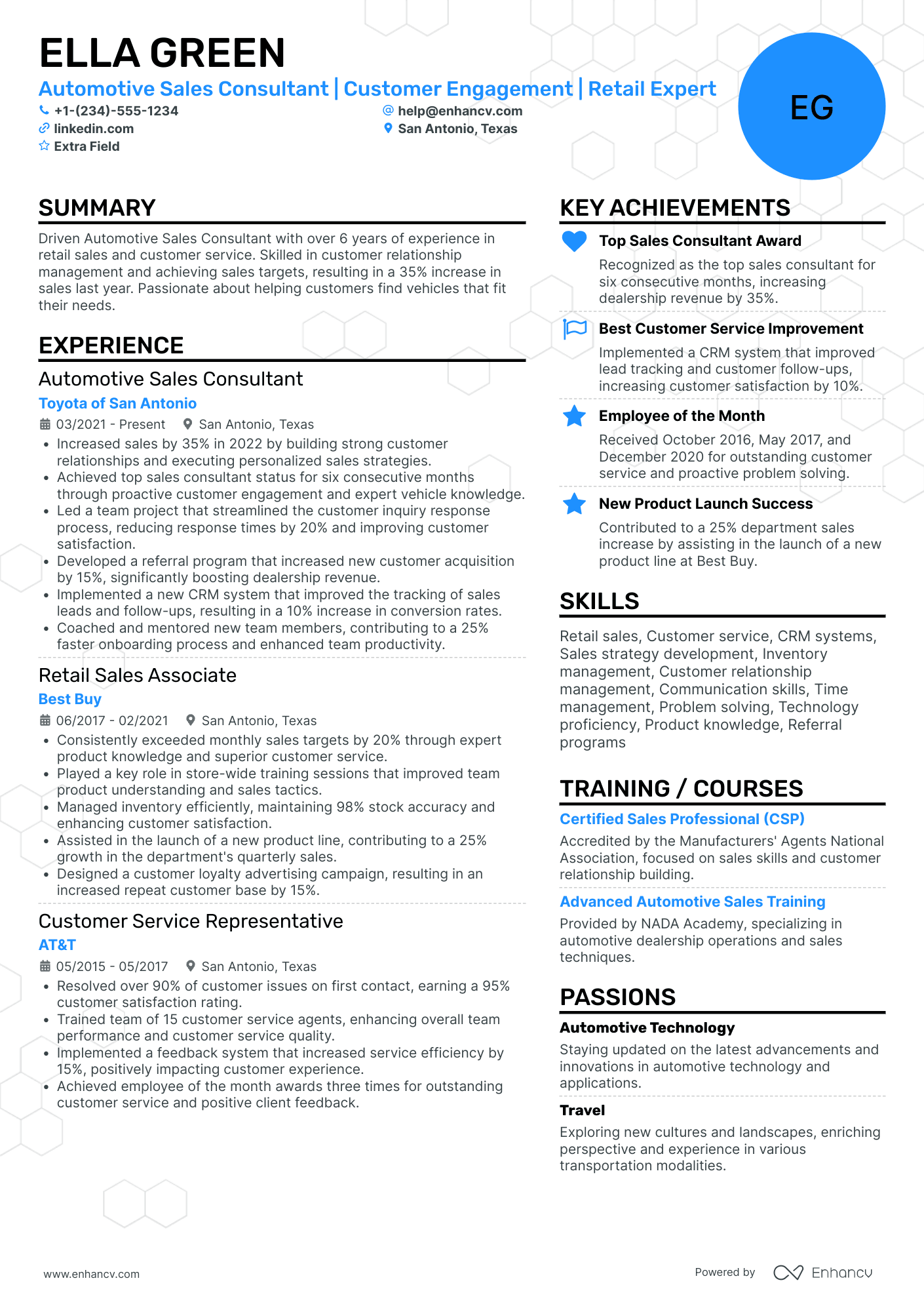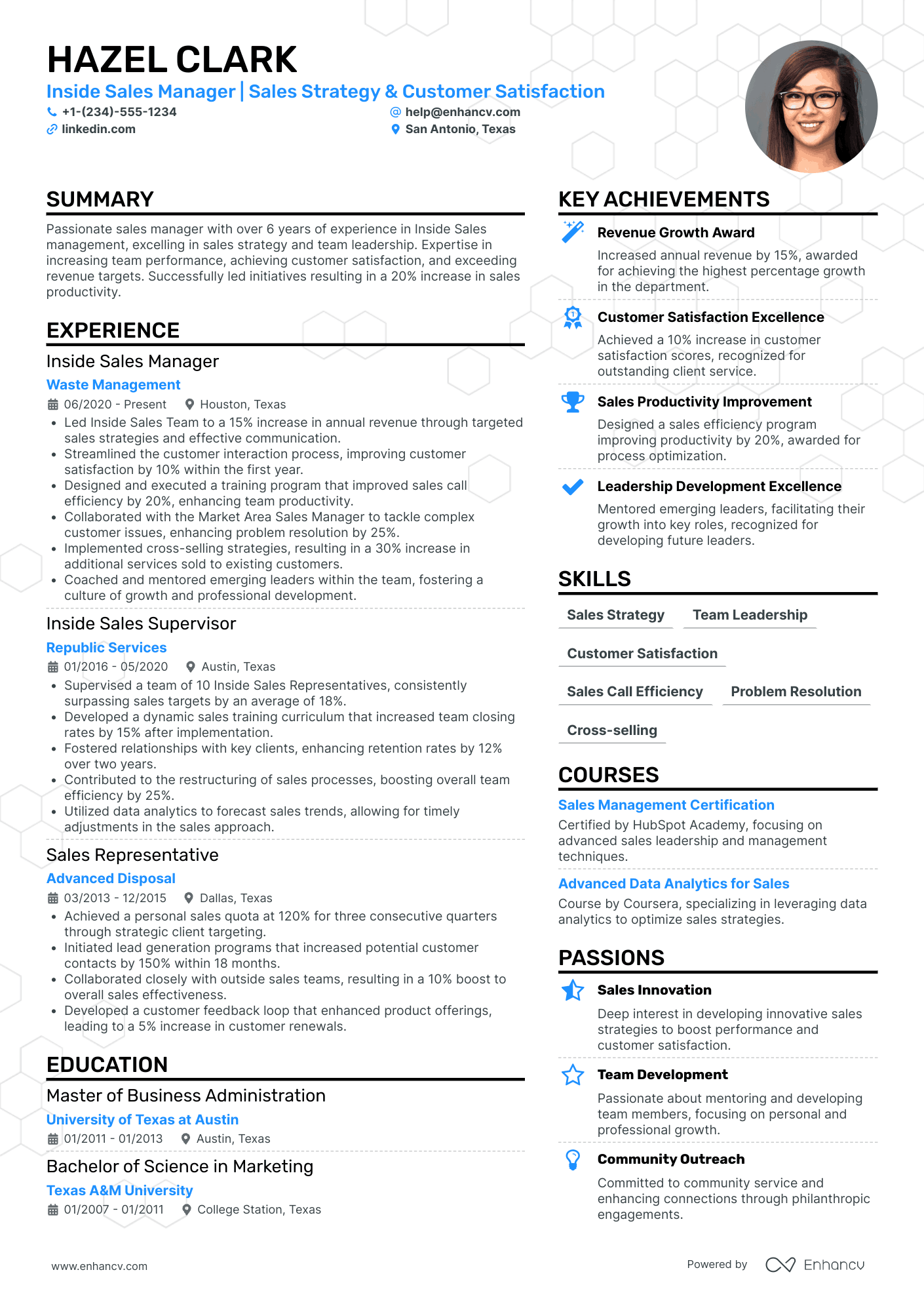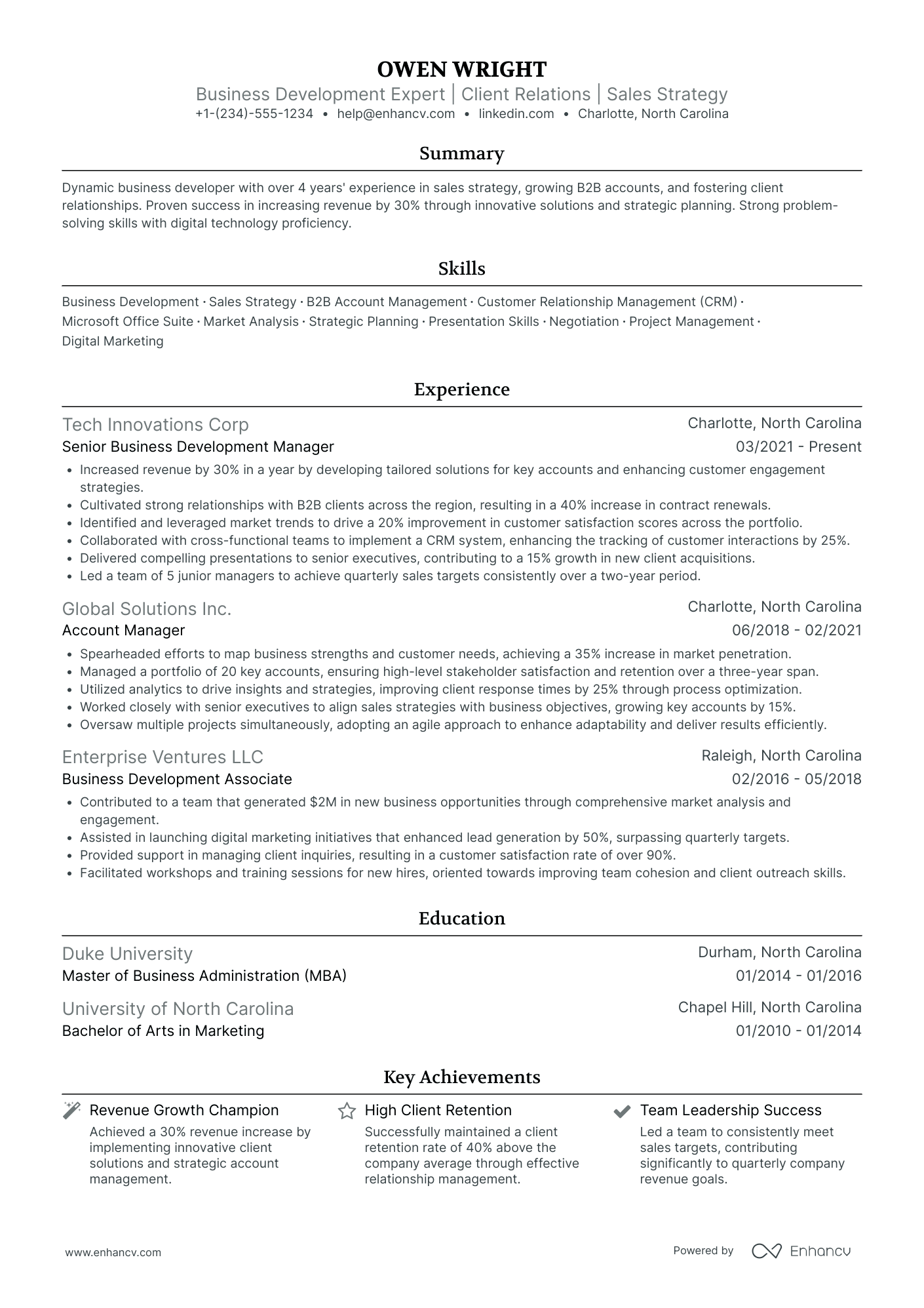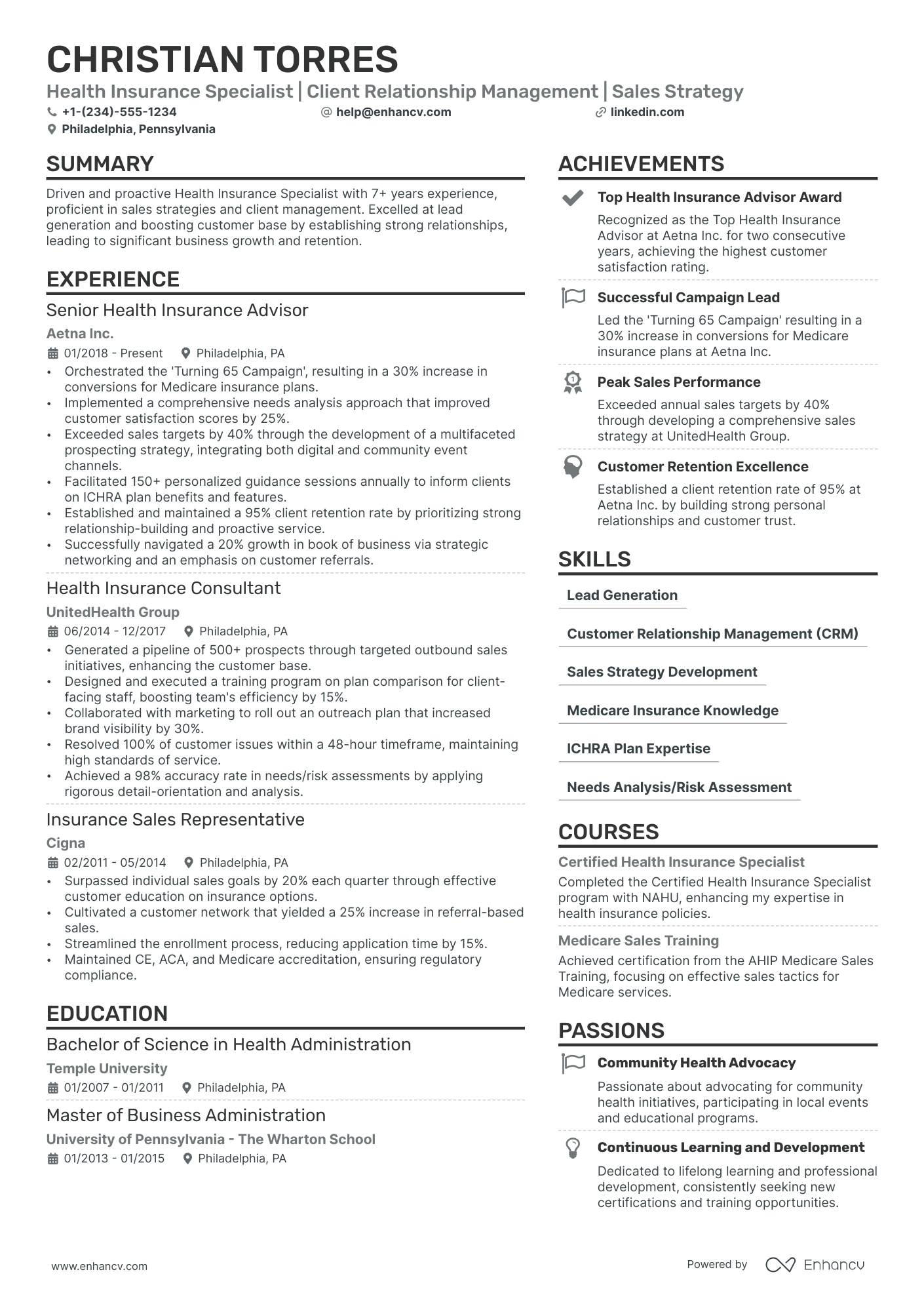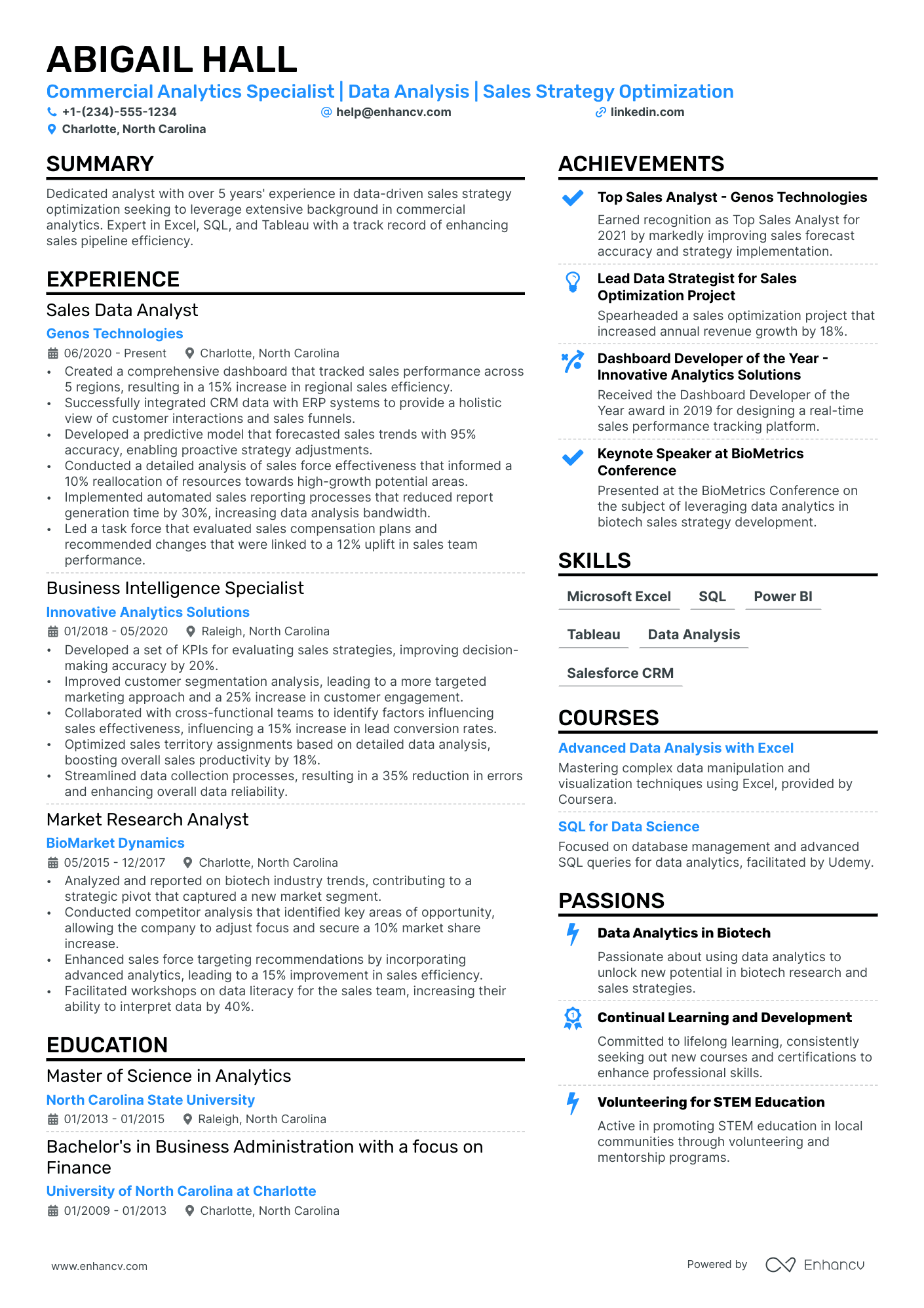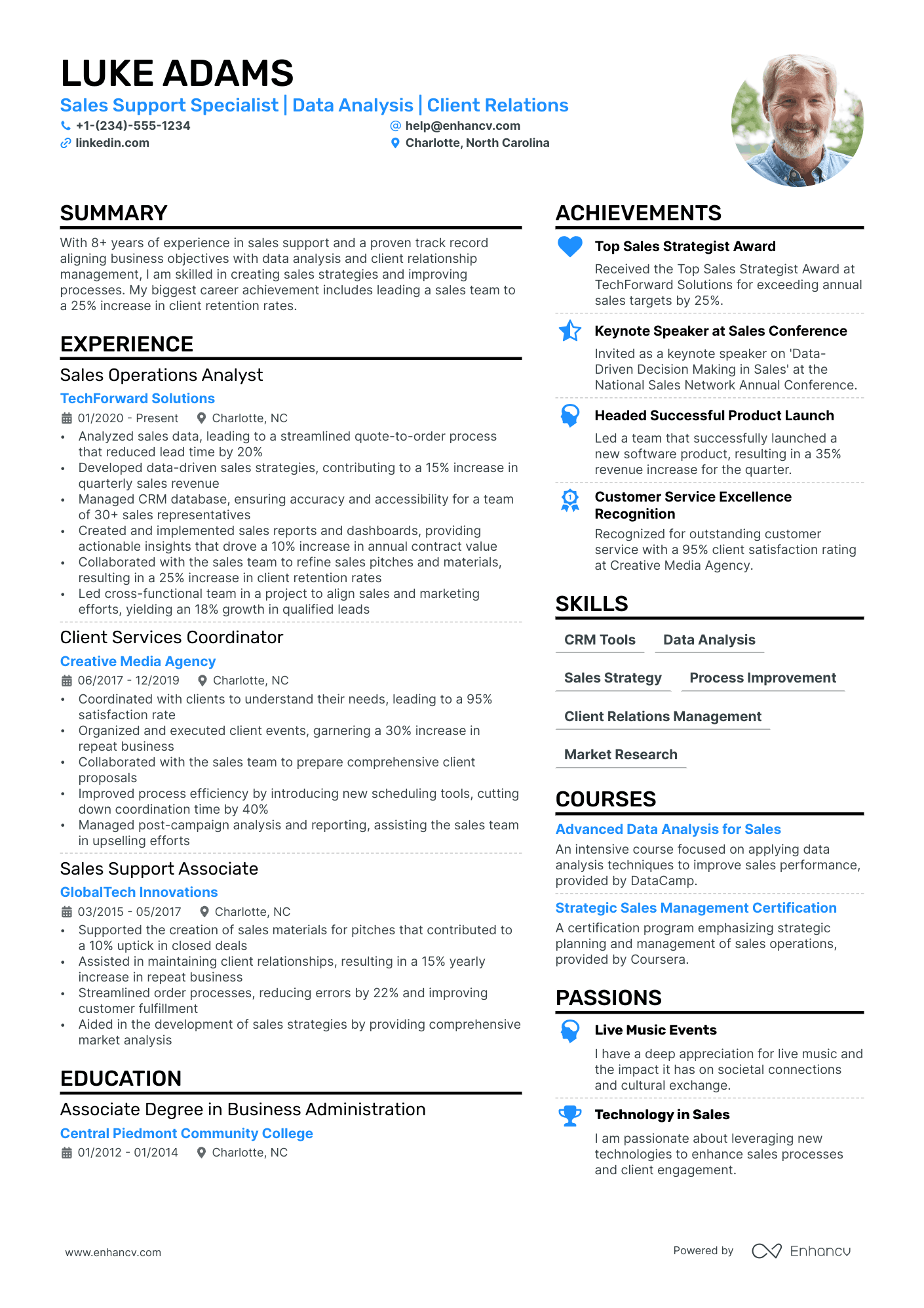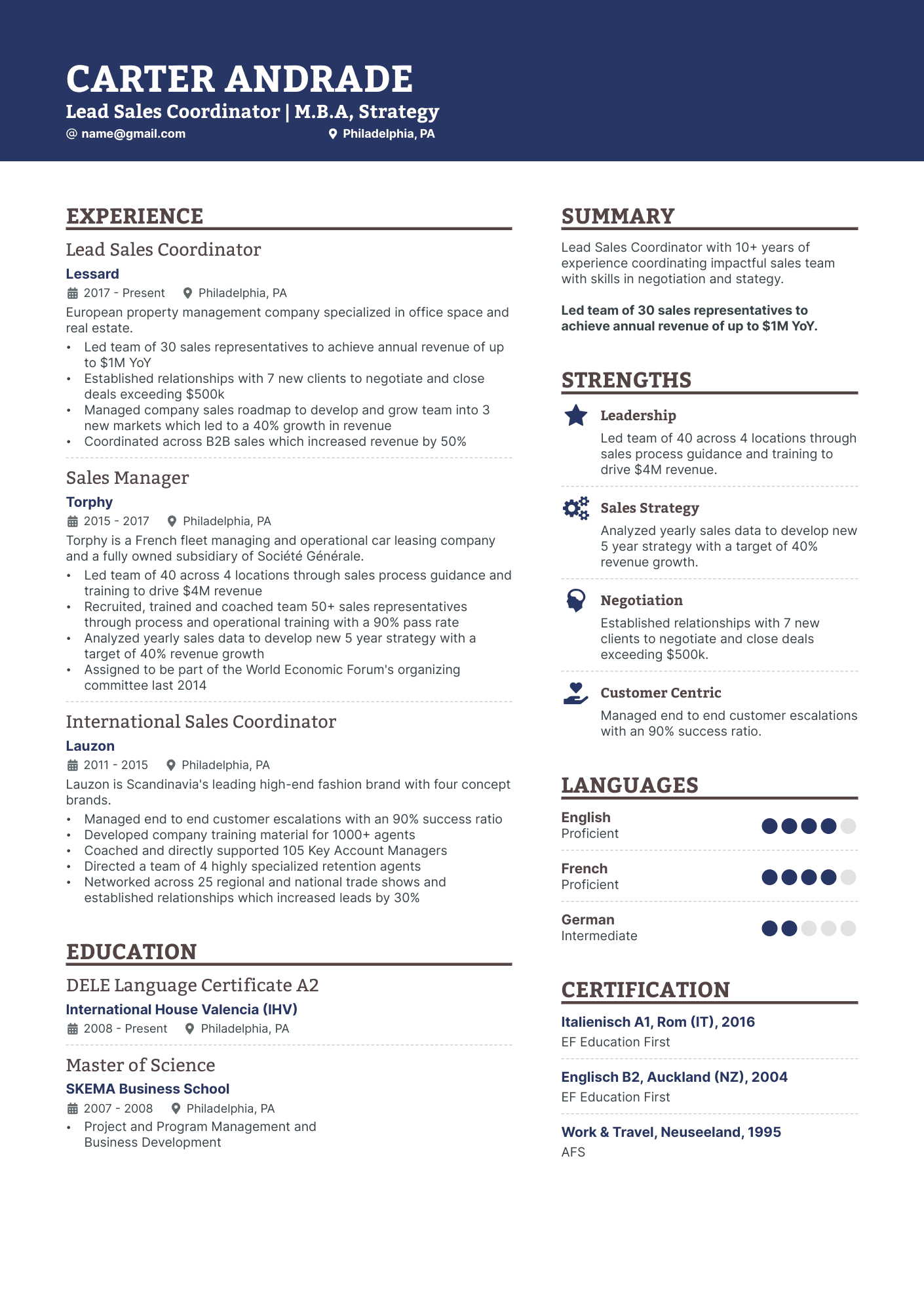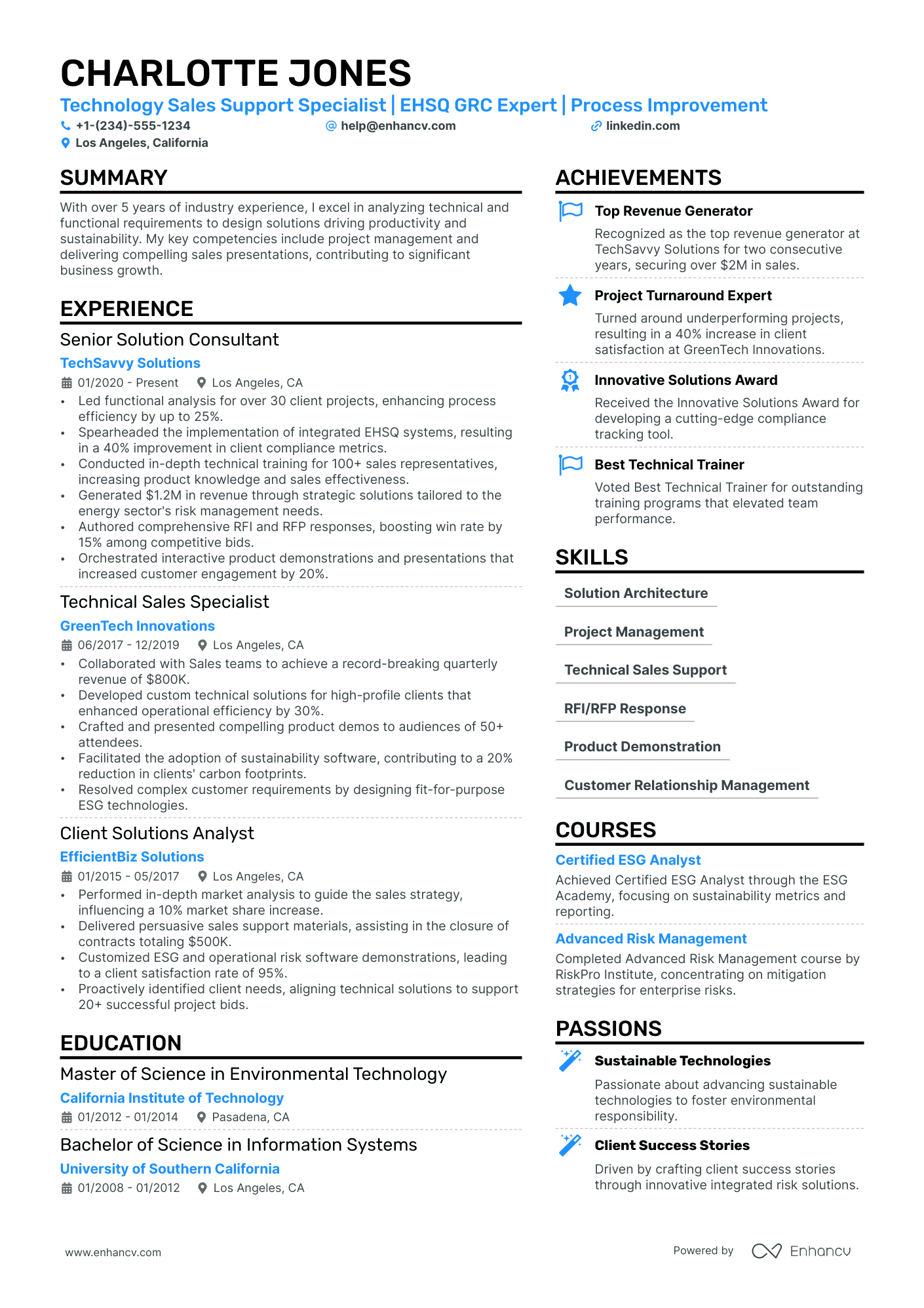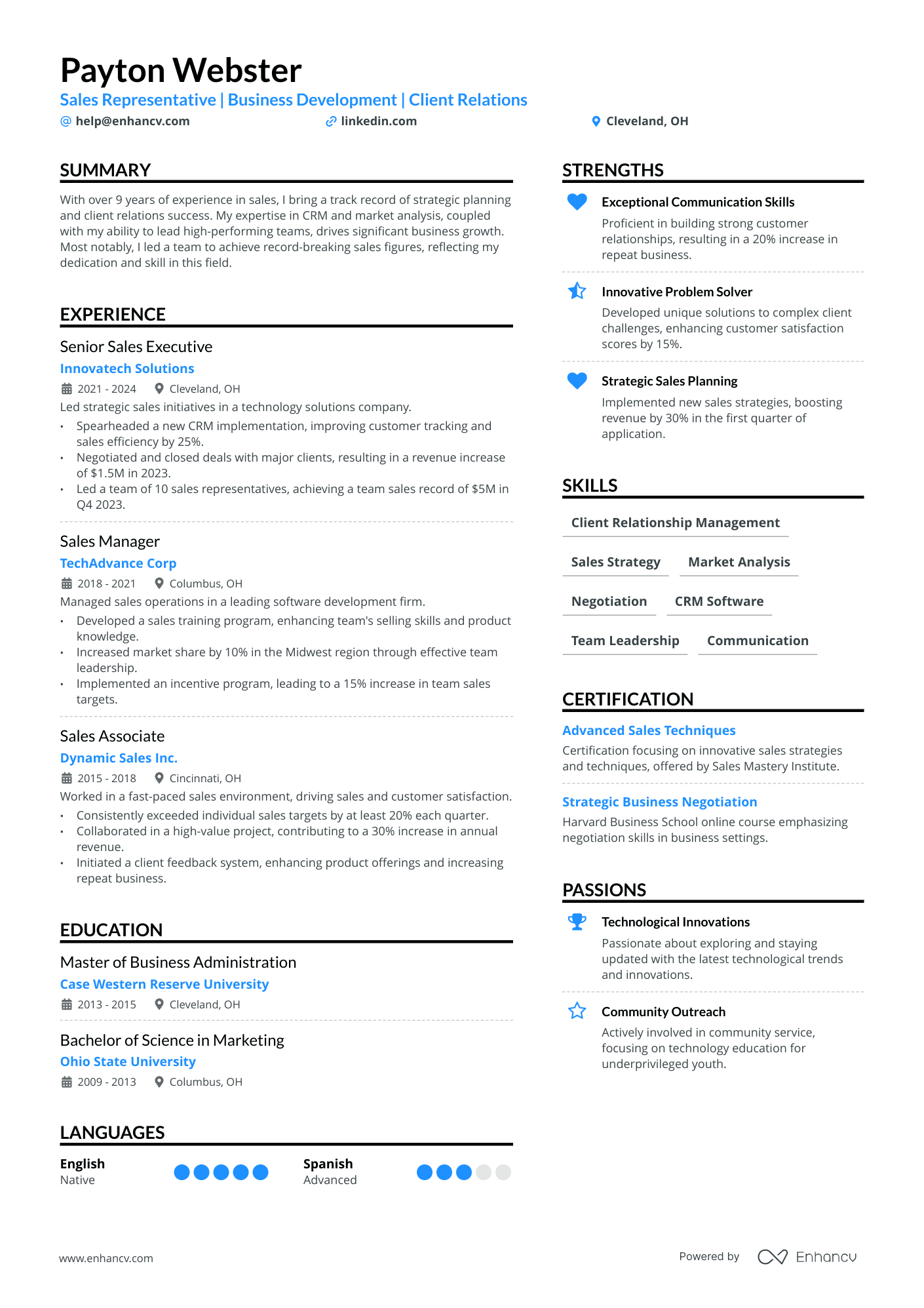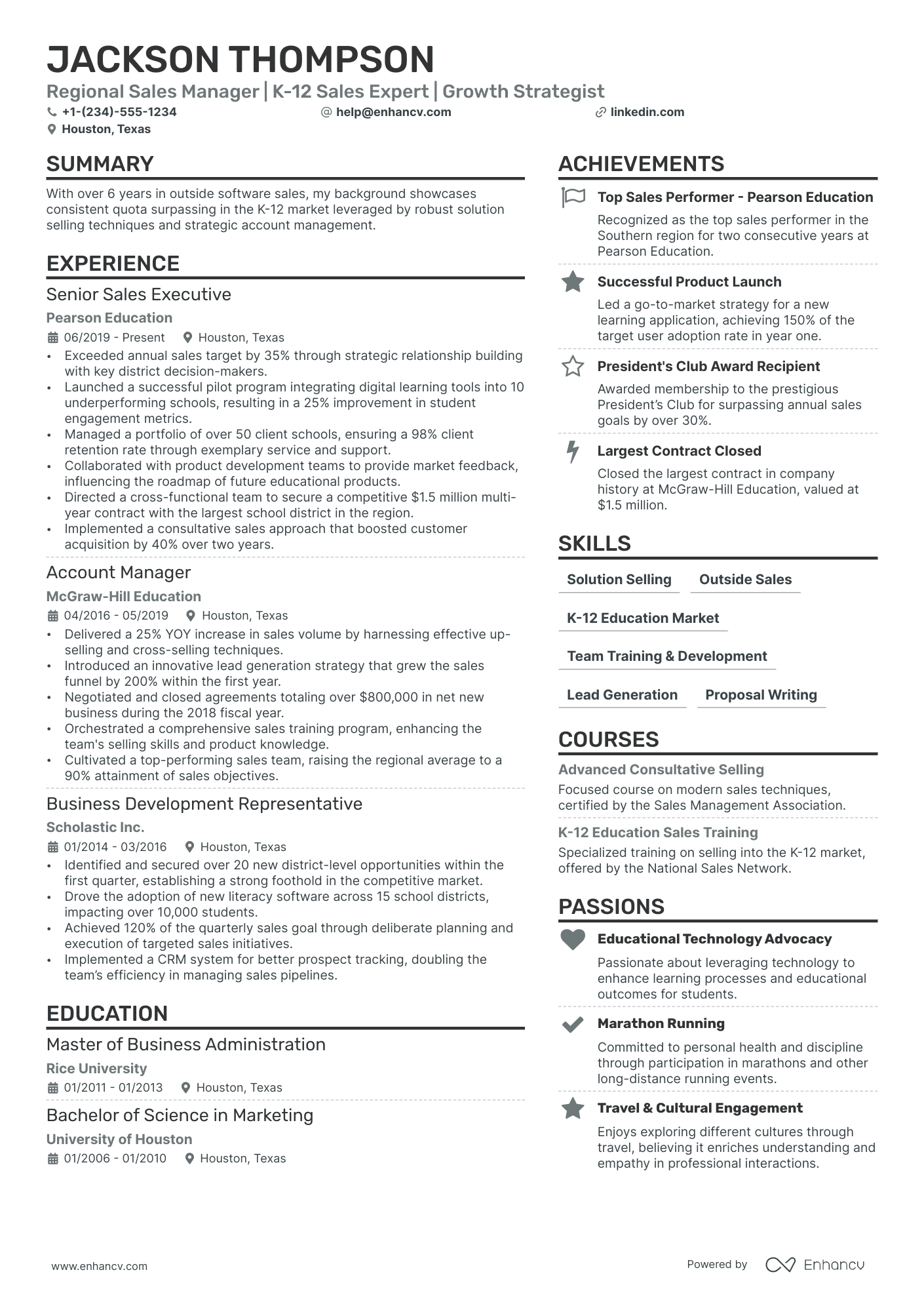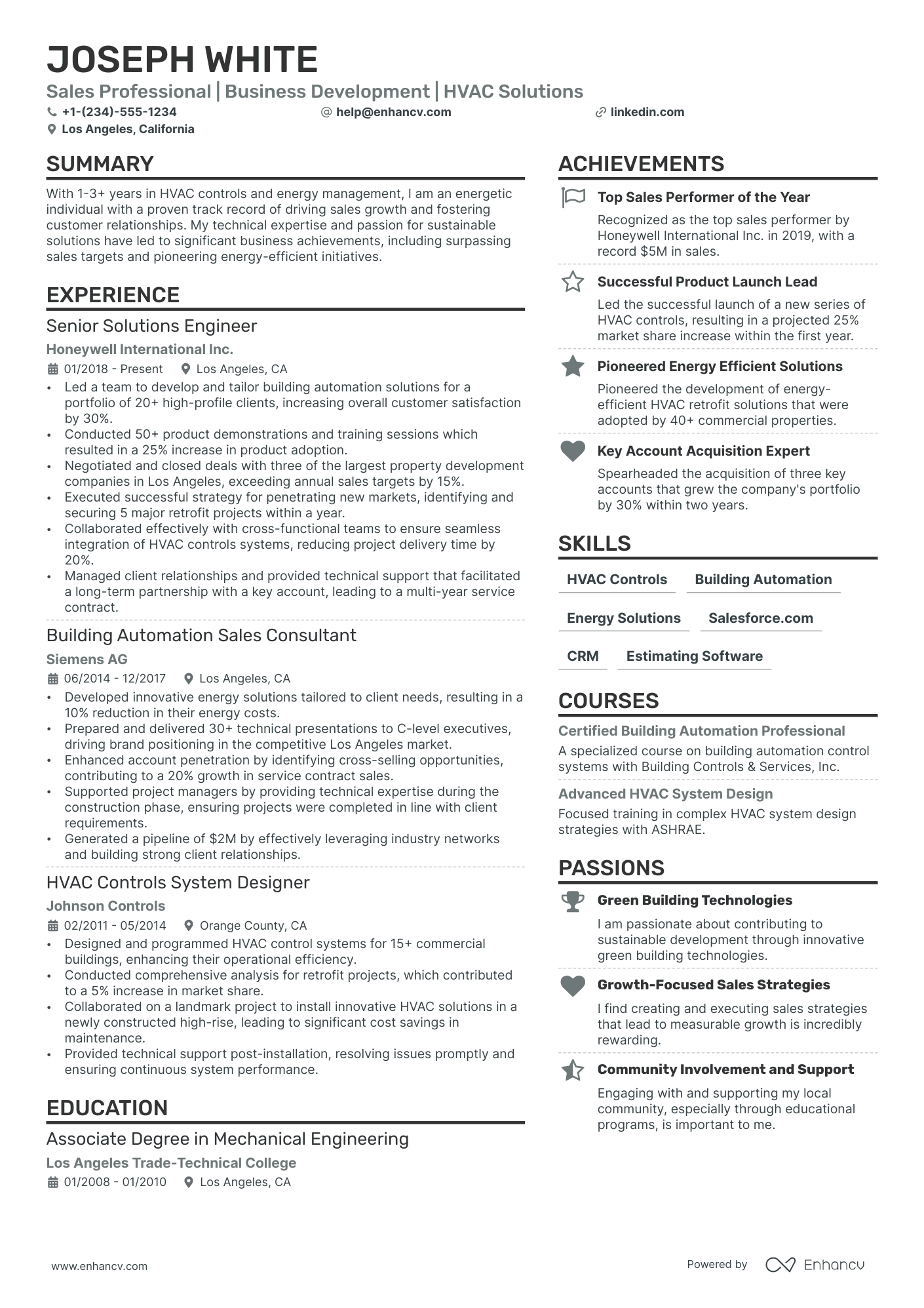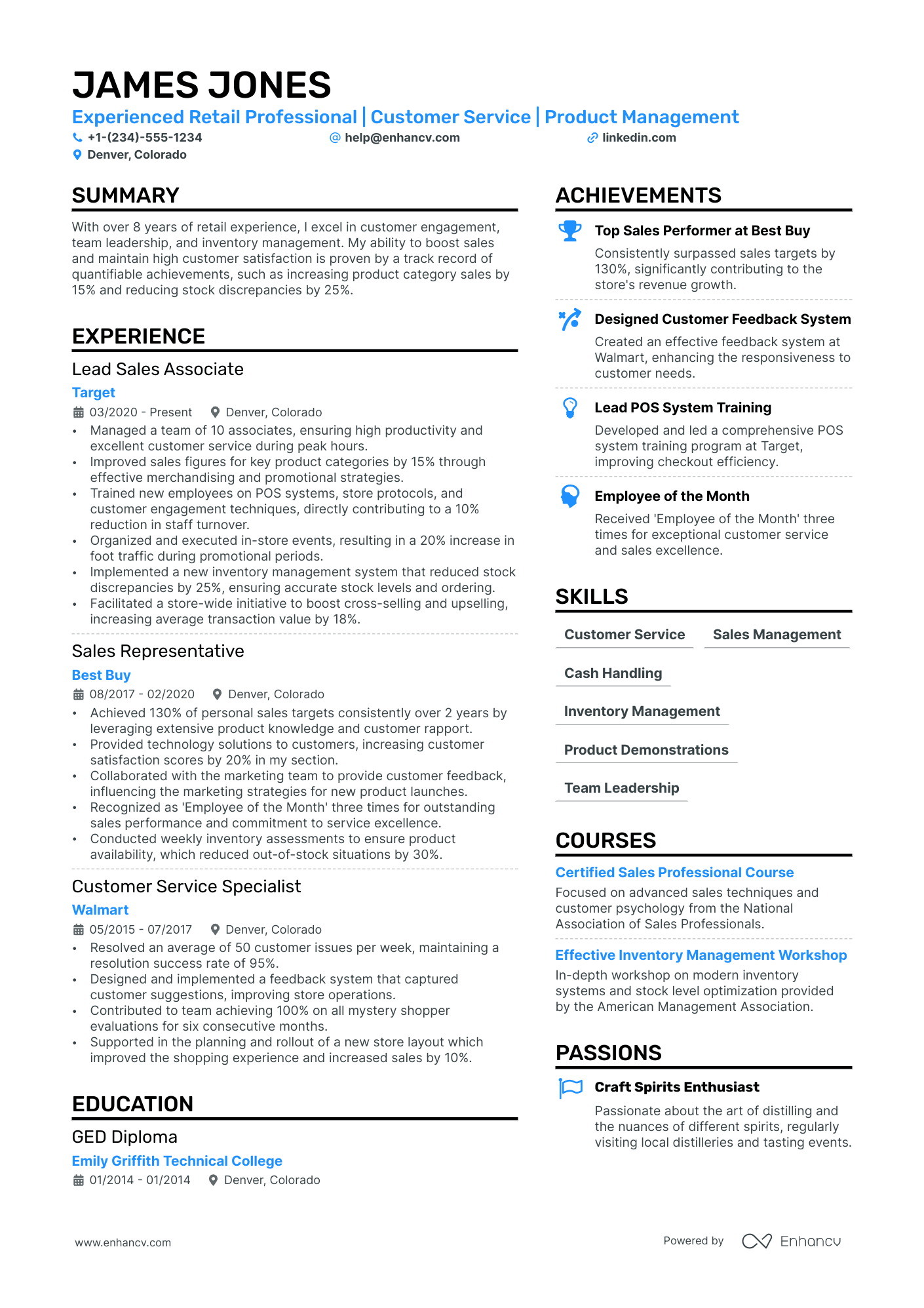Sales require a talent for persuasion. Hence, recruiters are looking for candidates who can demonstrate experience and promote their skills.
But you’re not sure how to go about it without sounding too arrogant.
We can help with that!
Our guide will teach you:
- How to get noticed by optimizing your sales resume for both ATS (Applicant Tracking Systems) checks and recruiters.
- How to build a solid experience section and a powerful resume summary.
- Various writing tricks you can use, each illustrated with a real sales resume example.
- How to create an assorted skills section that shows off your technical and social abilities.
And if you’ve set your sights on a specific sales role, we’ve got you covered:
Sales resume examples
By Experience
By Role
How to format your sales resume
Understanding your audience is crucial, both in sales and resume writing. Just as effective sales tactics hinge on resonating with the customer, a captivating sales resume relies on your excellent communication skills and ability to convince hiring managers of your value. In both instances creating a clear message, tailored to your audience’s needs and preferences is the key to success.
A powerful sales resume aligns your strengths with the company’s specific needs, mission and goals. It also showcases what you’ve achieved as a sales specialist so far.
To ensure you have a solid resume framework:
- Use the reverse-chronological resume format: Recruiters want to see how you’ve expanded the scope of your responsibilities and the projects you’ve handled over time.
- Opt for the hybrid resume format, if you’re transferring careers: Don’t dismiss prior work experience, especially if it’s within the same business niche. Underscore your transferable skills.
- Pick the functional resume format, if you’re a sales novice: No experience? No worries, this layout will allow you to put an emphasis on your formal training and all the sales skills you have to offer.
- List your LinkedIn in the resume header: Being in sales means you’re also representing a company and its brands. That’s why hiring managers must confirm how you conduct yourself professionally.
- Employ your sales skills in the resume summary: Even if you’re a novice, you must prove you can actually sell something. And it begins with your knowledge and skills.
- Showcase your career progress in the experience section: Emphasize your go-to attitude when it comes to tackling bigger and more complex sales campaigns.
- Don’t make your resume longer than 2 pages: Part of what makes a sales pitch effective is the art of being concise. So, if you have lots of experience, be selective with what you include.
- Choose a stylish design: When it comes to design, you can add a splash of color to make your resume stand out. Just don’t go overboard and turn your application into a promotion poster.
- Pick a cool, but readable font: Long gone are the days when you had to stick to Arial or Times New Roman to make your resume presentable. Lato and Exo 2 are great alternatives, but other serif and sans-serif fonts work, too!
- Optimize your sales resume for ATS scans: Hiring managers rely on ATS software to filter out the viable candidates. To pass these scans, make sure to repeat keywords and phrases you see in the job ad.
- Save your application as a PDF file: Don’t risk wasting your writing and formatting efforts by saving your sales resume as a Word document. More often than not, this file type scrambles the document design to adjust it to the reader’s device settings.
Delving beyond the general sales resume structure recommendations, and knowing what sections to add and where to place them is vital for your success.
If your work history is short or is not directly related to the sales field, push the skills and certification segments near the top of your resume. Showcase you’ve undergone the necessary training and you’re familiar with the fundamental sales principles. Plus, indicate how you want your career to progress in the future.
On the other hand, if you’ve been in the industry for a few years now, start with your most relevant positions. Be mindful to stick to the reverse chronological order, when listing them.
Then, include any additional qualifications you’ve obtained as a sales expert.
The layout of a resume can differ by region – Canadian resumes may use a distinct format.
Is your resume good enough?
Drop your resume here or choose a file. PDF & DOCX only. Max 2MB file size.
It may seem like a lot to keep track of, but there are only five must-have sections:
The top sections on a sales resume:
- Contact information: Allow recruiters to contact you easily via email or your business profiles. It’s no use getting noticed if hiring managers can’t reach you.
- Sales objective or summary: Inform recruiters of your career goals and how they align with the role in question.
- Experience in sales: Show hiring managers that you have relevant experience in the role they're hiring for.
- Sales skills: Display the skills and knowledge that make you the best fit for the role.
- Education: Recruiters are interested in your academic background because they want to ensure you have a foundational understanding of sales principles.
Each of the sections above focuses on a particular area of your expertise. But while these simplify the process of categorizing your experience and skills, they don’t indicate the specific details hiring managers are searching for in a sales resume.
So, here are the top points your sales resume must cover to draw recruiters’ attention:
What recruiters want to see on your resume:
- Sales experience: Prior practical experience gives recruiters confidence in your ability to perform the job, as it demonstrates that you have already honed some of the necessary skills in a real setting.
- Communication skills: A crucial part of sales is being able to effectively convey information and persuade customers, which is why recruiters prioritize this as a key characteristic in potential hires.
- Knowledge of the product/industry: Understanding the product or the industry means you can craft strategies that will appeal to the company’s target demographic.
- Demonstrated achievement of sales goals: Hiring managers prioritize measurable accomplishments because they show your ability to deliver results and meet targets.
- Client relationship management: Recruiters look for this skill to ensure you can handle and grow relationships with clients effectively to maximize sales and client retention.
How to write your sales resume experience
As its name suggests, the resume experience section is where you lay out your relevant work history, along with pertinent achievements and awards you’ve obtained for each of the positions you’ve held. That’s because hiring managers want to know the results of your actions, instead of what you did on a day-to-day basis.
When it comes to sales, the effectiveness of marketing strategies and tactics is measured by the conditions and environment in which they have been applied. Simply put, without context and results, sales approaches are mere tools. Yet, understanding where and how to apply these instruments is crucial. Hence why recruiters are so focused on achievements, They want to ensure you know how to apply your knowledge and expertise before they give you a chance at an interview.
Use the experience section to display the scope of your sales experience by referencing important moments of your career. If you’re transferring from a different industry, stress the relevance of your specific business niche expertise to the company’s business operations as well as the role you’re applying for. For instance, having pharmaceutical knowledge will make a good impression on recruiters, if you’re striving to become a sales representative within the beauty industry.
Yet, your experience doesn’t have to come only from past job positions you’ve held. Depending on the company’s main product or service, your expertise may come from:
- Volunteering and side gigs you’ve done.
- Being a member of an interest group or association.
- Having a deep understanding of the particular industry and the competitors within the niche.
- Trying to develop a similar product or service yourself.
Regardless of which route you choose, remember to link your sales experience to specific achievements. The best way to frame each bullet point in your entries is to:
- Begin with an action verb to enhance the impact of your wording.
- Provide context to explain why this particular success story is worth mentioning.
- Finish off by detailing the outcome of the situation.
- Remember to use resume keywords and phrases from the job ad to tailor your experience section.
Hiring managers are searching for applicants who masterfully balance thoughtfulness, responsibility, and decisiveness. The perfect candidate is aware that actions have consequences, but at the same time, they’re goal-oriented and proactive.
To illustrate, check out the following sales resume example experience section:
- •Achieved a 30% cold calling success rate for 2022.
- •Increased the monthly Average Order Value (AOV) for 40+ client accounts.
- •Awarded Sales Representative of the Month.
While the section highlights some of the candidate’s abilities and achievements, the lack of attention to detail is evident. The applicant has:
- Missed the chance to include a company website. Showcasing the type and quality of products and services your past employers offer can provide insight into the target audiences you’re used to analyzing.
- Omitted key details about the listed achievements. Having a “30% cold calling success rate” doesn’t mean much if it can’t be compared to the overall scale of the company’s business operations.
- Failed to make their sales Representative of the Month award count for something. This is an in-house prize. As a result, eligibility to receive such acknowledgments varies from company to company. So, recruiters won’t be able to determine the scale of your success if the criteria isn’t public or widely recognized within the industry.
Business owners are concerned with the bottom line. So, whenever possible, don’t forget to mention the scale of the projects you’ve handled. Also, make sure you clearly show the link between your actions and the results you’ve achieved.
Here’s how this candidate enhanced their experience section after consulting with us:
- •Achieved a 30% cold calling success rate for 2022 and, as a result, onboarded 170 new business clients.
- •Increased the monthly Average Order Value (AOV) for 40+ client accounts by 59% through various upselling methods.
- •Awarded Sales Representative of the Month 3 times in a row for closing over 18 deals above $45,000 for each respective month.
Straight away, recruiters know the:
- Type of clients the applicant has experience with.
- Revenue growth they can bring on a monthly and yearly basis.
- Candidate’s strengths when it comes to sales skills.
How to quantify impact on your resume
By now you’ve seen just how vital measuring the impact of your work is. For a performance-based job like sales, this is especially important because your work must deliver the desired results.
It’s true that certain job aspects can be difficult to quantify, so we’ve compiled a list with some metrics you can reference on your sales resume to get you started:
- Numeric sales achievements: Demonstrate your ability to meet sales targets.
- Percentage increases in sales: Underscore your contribution to driving growth and improving sales performance.
- Size of your client portfolio: Reveal the number of clients you’ve effectively managed to show your ability to handle pressure and foster professional relationships.
- Revenue generated: Highlight your direct impact on the company’s bottom line.
- Number of cold calls made: Display your proactive approach towards securing new business.
- Increases in market share: Indicate your strategic ability to grow the business.
- Quantitative growth of customer base: Prove you have stellar client acquisition skills.
- Sales rankings: Feature any professional acknowledgments from past employers to demonstrate your talent for high performance.
Writing a sales resume with no experience
We’ve already noted some of the ways you can display relevant sales experience, despite a short work history. But if you’re on your path to securing your first job, you can still reference:
- Volunteering and fundraising experience.
- Memberships in professional associations and organizations.
- Relevant research you’ve conducted and case studies you’ve published.
- Additional training you’ve completed.
Once you’ve determined what you want to detail on your sales resume, just remember to:
- Frame each entry as a project if you’re not formally employed.
- Start your bullet points with the appropriate action verb.
- Explain what was the goal of your project and the actions you took.
- Share the results and insights your work offers.
How to list your hard skills and soft skills on your resume
No resume is complete without the skills section. It outlines the scope of your technical and social attributes. Particularly the ones you haven’t had the chance to address anywhere else on your resume.
Generally, they can be divided into two categories:
- Sales hard skills: These cover your knowledge of basic sales principles, contract management, and lead generation. Basically, the relevant know-how you can’t do your job without.
- Sales soft skills: These demonstrate how well you work with other colleagues, as well as your ability to foster business relationships and negotiate contracts.
We know it’s tempting to overcrowd this segment with your top technical abilities. However, hiring managers are looking for candidates with a well-rounded profile. This means that the perfect applicant has to have analytical thinking and high emotional intelligence.
To make sure you don’t overcrowd your skills section:
- Read the job requirements listed in the job ad.
- Review your sales resume once again and write down which of the skills from the job ad you haven’t mentioned so far.
- Think of relevant achievements for each of the new elements you want to add to this section.
- Begin each description with an action verb.
- Provide some context to explain why your accomplishment is significant.
- Outline the outcome of your work.
Depending on the position, a various combination of your skills will be required. But if the job ad doesn’t offer much information, we’ve prepared two lists with top sales skills to help you out:
Best hard skills for your sales resume
- Negotiation
- Closing Deals
- Salesforce CRM
- Microsoft Excel
- Data Analysis
- Lead Generation
- B2B sales
- B2C sales
- Direct sales
- Product Knowledge
- Pipeline Management
- Sales Presentations
- Cold Calling
- Market Research
- Contract Negotiation
- Sales Strategy Development
- Client Retention
- Zoho CRM
- Sales Reporting
- Contract Management
Best soft skills for your sales resume
- Communication
- Empathy
- Persuasion
- Time Management
- Patience
- Flexibility
- Listening
- Creativity
- Networking
- Relationship Building
- Confidence
- Resilience
- Self-Motivation
- Adaptability
- Problem Solving
- Teamwork
- Personal Organization
- Customer Service
- Emotional Intelligence
- Public Speaking
How to list your certifications and education on your resume
Another way to reference certain abilities and expertise you have is to illustrate your academic background.
Every company has its own requirements when it comes to the type and level of education they demand from candidates. Generally, a Marketing Management or Business Administration degree goes a long way. Although some employers are happy with applicants who have the equivalent practical experience instead.
That’s why, even if you’re transferring from a different field, your chances of securing the position aren’t impossible. Especially, if your degree is related to the business niche in which you’ll operate.
With that said, if you’re a tenured professional with a college degree, build your education section by including your Bachelor’s and/or Master’s degree. For each entry you’ll need to list:
- The name of your degree and your college.
- The date of course completion.
- One or two of your academic achievements.
On the other hand, if you're a recent graduate, make sure you also include one piece of relevant coursework or related majors and minors that align with the role-required skills.
Here’s how to do it:
- •Researched and presented a paper on Profanity as a Sales Tool: The Impact of Swear Words in Sales Copy
- •Majored in International Marketing Management, Digital Marketing and e-Commerce Marketing.
In addition, if you don’t want to add your high school diploma, certificates are always a good alternative.
These are even easier to incorporate into your resume. Just list the name of your qualifications, as well as the name of the issuing organization. Like so:
If you’re not sure which certificates to include on your sales resume, we’ve compiled a list with the current most popular certificates with recruiters:
Best certifications for your sales resume
How to write your sales resume summary or objective
Pay special attention to how you frame your resume profile. This is a short paragraph, placed right below the resume header. It’s freeform in nature and outlines your key career achievements—consider it your sales pitch to hiring managers and potential employers.
Based on how much sales experience you have, there are two types of resume profiles you can choose from.
The first one is the resume summary. This type is best used by specialists with at least 4 years of practical sales experience.
If you opt to write a resume summary, make sure to mention:
- Notable past employers.
- At least two significant career achievements that relate to the available position.
- At least three core job skills—remember to use keywords and phrases.
By contrast, if you’re still a sales novice, the resume objective is the way to go. Like the summary, it provides a brief description of your professional wins so far, but here the focus is mainly on your:
- Ability to align your strengths and expertise with the company’s goals.
- Top technical and social skills.
- Education and certifications.
Let’s look at a few examples so you can see the difference.
First, check out the following sales resume objective sample:
It doesn’t pack the same punch as a sales pitch usually does. This sample’s main issue is the lack of specificity. The candidate states they’re proficient in various skills. Yet, the objective doesn’t detail how these talents were acquired or where for that matter. Plus, the candidate doesn’t mention any relevant internships or side work to support their application.
Finally, the resume objective claims the applicant is “currently undergoing training to become certified.” But there are many sales-related certificates out there and employers can be very picky when it comes to which certificates they deem preferable.
Here’s how adding a few details can make your objective statement more convincing:
Now, take a look at the sales resume summary example below:
Very unimpressive!
Although the success of your resume profile relies on top-notch pitching skills, don’t treat the summary as a dating profile. Don’t count on resume buzzwords to stand out as they don’t add value to your application. What’s more, this candidate is far too succinct because they haven’t:
- Mentioned any relevant achievements or special training.
- Shared the names of the awards they’ve won, some of which could be completely unrelated to the job in question.
- Listed the exact name of the certificate they hold. Don’t forget that the names of certificates and certain skills often serve as keywords when it comes to ATS checks.
With these points in mind, the following edit shines a better light on the candidate’s qualifications:
This version lets hiring managers know exactly what they can expect from this applicant, such as:
- An annual revenue increase.
- Excellent contract management and relationship-building skills.
- A professional who’s in step with industry trends.
Optimize your resume summary and objective for ATS
Drop your resume here or choose a file.
PDF & DOCX only. Max 2MB file size.
Additional sections for a sales resume
Using cookie-cutter sales resume templates is a thing of the past. While it’s recommended you follow certain best practices, using a standard resume template is the same as trying to promote two competing products by using the same sales tactics.
To stand out you must truly make the resume your own. This means that your individuality must shine through.
Adding extra sections to your sales resume is a smart way to get noticed by recruiters. This way you can include relevant bits of information about your expertise that don’t really fit the mold of other sections.
For instance:
- A portfolio with case studies, research, and presentations you’ve done, even if only as part of your coursework.
- Awards, prizes, and other professional recognitions from past employers you’ve received.
- Promotion and marketing campaigns you’ve designed and facilitated for charity events.
How to put a presentation section on your resume
Some of the extra section examples we’ve listed don’t really apply to novice sales specialists.
That’s why, if you don’t have much experience, your best option would be to share a presentation you’ve done. This way you can showcase where your expertise lies, as well as the breadth and depth of your sales knowledge. It will also prove how up-to-date you are with industry trends.
To do this:
- Leave some free space near the education section.
- List the title of your presentation.
- Provide a summary of what your presentation is about.
- Cite the start and end date of your project.
- Share at least one achievement that resulted as a direct consequence of your presentation.
- Link to an online version of your work, if applicable.
You can follow the education section format above or the example we’ve prepared below:
- •Secured a year-long internship with eWin Digital Agency as a B2C Sales Advisor.
Key takeaways
And that’s how you build a powerful sales resume! Simply:
- Pick the reverse-chronological resume format to detail your work history.
- Include your LinkedIn profile in the resume header.
- Use the chance to turn your resume summary into a sales pitch.
- Bear in mind to quantify the achievements you list in the experience section.
- Show a glimpse of your character by attaching extra sections to your resume.
- Highlight your academic background and any additional training you’ve undergone.
- Supplement your skills section by referencing talents or aspects of your personality that you haven’t had the chance to address elsewhere on your resume.

